


JUNE 2018 1 SYDNEY • MELBOURNE • ADELAIDE • BRISBANE • PERTH • CANBERRA Level 24/44 Market St, Sydney 2000 • GPO Box 108, Sydney 2001 • Ph: 18000 15 8 47 • email: info@indianlink.com.au SYDNEY • MELBOURNE • ADELAIDE • BRISBANE • PERTH • CANBERRA Level 24/44 Market St, Sydney 2000 • GPO Box 108, Sydney 2001 • Ph: 18000 15 8 47 • email: info@indianlink.com.au WINNER OF 21 MULTICULTURAL MEDIA AWARDS MONEY MATTER $ ADELAIDE FREE JUNE 2018 • info@indianlink.com.au • www.indianlink.com.au





2 JUNE 2018 www.indianlink.com.au #1 for student support* #1 for overall employment* #1 for median starting salar y* #1 for teaching scale* * Victorian Institution Survey Results 2017. Australian Federal Government’s Quality Indicators Learning and Teaching (QILT) www.qilt.edu.au ^ Good Universities Guide 2010–2017 Success Stories Start Here ... #1 for teaching quality ^ (8 years in a row) Master Programs Master of Technology - Software Engineering - Enterprise Systems & Business Analytics Master of Professional Accounting Master of Business Administration ENROL NOW 1300442482 admissions@iibit.edu.au /IIBITAUS Bachelor Programs Bachelor of Information Technology - Business Information Systems - Mobile App Development - Software Development - Networking and Security Bachelor of Commerce - Accounting Bachelor of Business Sydney Ground Floor, 841 George Street Sydney, NSW 2000 Adelaide Level 6, 127 Rundle Mall Adelaide , SA 5000 Infotech Professionals Pty Ltd. Trading as International Institute of Business and Information Technology.Provider CRICOS Code 01917B Federation University Australia CRICOS Code 00103D Scholarships Available 25% for July 2018 Exclusive for Adelaide
PUBLISHER
Pawan Luthra
EDITOR
Rajni Anand Luthra ASSISTANT EDITOR
Neha Malude
MELBOURNE COORDINATOR



Preeti Jabbal
CONTRIBUTORS
Avi Chandiok, Hamida Parkar, Natasha Jha Bhaskar, Auntyji, Minal Khona,
ADVERTISING MANAGER
Sukesh Thapliyal 0410 578 146
ADVERTISING ASSISTANT
Charuta Joshi 02 9279 2004

FOMO makes way for FOOP in property market
BY PAWAN LUTHRA
Indian Link is a fortnightly newspaper published in English. No material, including advertisements designed by Indian Link, may be reproduced in part or in whole without the written consent of the editor. Opinions carried in Indian Link are those of the writers and not necessarily endorsed by Indian Link. All correspondence should be addressed to:
INDIAN LINK MEDIA GROUP
Level 24/44 Market St, Sydney 2000
GPO Box 108, Sydney 2001
Ph: 02 9279-2004
Fax: 02 9279-2005
Email: info@indianlink.com.au
There are two investment sayings which have weathered the test of time, one being that whatever goes up, will come down. In hindsight, one might well be talking about nature and physics rather than cold, hard economic reality. The other saying is that when your cab driver (or Uber driver these days) starts giving you investment advice about a particular product, it is time to sell that product.
Not that taxi or Uber drivers are not savvy people; it’s just their wisdom may have been acquired by talking to many people, rather than technical research and analysis.
Property prices in most capital cities of Australia seem to be on the way down and there seems to be little in the way of holding back this slide. Buyers
who twelve months ago were rushing in to buy due to a Fear Of Missing Out (FOMO) now seem to be worried about the Fear Of Over Paying (FOOP). Investment decisions are normally propelled by fear or greed and at this time, vendors are still motivated by high valuations of the past and their greed to get that value, while buyers are fearful of paying too much and are holding off their decisions. It seems that the buyers are winning.
In the latest figures, Sydney’s auction clearance rate fell to about 50 per cent, while in Melbourne it was about 62 per cent, both well below recent highs. Interestingly, clearance rates for Adelaide and Brisbane were higher than a year ago. The property market which has seen positive growth for over seven years, is now facing some headwinds.
For the Indian Australian who has migrated here in the last few years and rushed into acquiring property, they may well have to get used to reports of falling prices over the next few months as banks tighten their controls, overseas investors
dry up and generally the steam goes out of the market. If their purchase is for residential purposes, they need to think long term and go with the flow. For those who have borrowed to invest, they may find their banks looking more closely at their loans and they need to make sure that their cash flow is secure, and that they have built up some equity in their property so that any downward pressure on valuation does not leave them short. If you are a migrant looking to buy, then hold your nerve. Economic indicators are pointing to an extended time of downward pressure on property valuations. Currently properties are not selling quickly, sellers have started to discount, and real estate agents are working harder to achieve a sale. It is a matter of time before better opportunities to buy start emerging. Of course, as Indian Australians, we do love a bargain. When you feel that the time is right to buy but need verification, do take a few Uber rides. If your friendly driver says it is not the best time to be buying, you know what to do.

JUNE 2018 3
EDITORIAL
YOUR SAY
ANZAC DAY 2018
RAJNI ANAND LUTHRA wrote about Indian veterans seeking acknowledgement for their service, on the occasion of ANZAC Day 2018 Bawa Singh Jagdev OAM wrote: The Anzac Day march (originally the Battle of Gallipoli or the Dardanelles Campaign) story was a good piece of journalism. But more should have been said about the battle of Gallipoli and the forces who fought in it, as the March was mainly to honour those men and women who made the supreme sacri ces when the ill-conceived strategy of Winston Churchill to control the sea route from Europe to Russia during World War I began with a failed naval attack by British and French ships on the Dardanelles Straits in February-March 1915. Although the Sikhs and Gorkhas fought together side by side with the ANZAC and nine Sikhs were enlisted in the Australian army in WW1, the request by the National Sikh Council to march in the ANZAC Day parade to honour those Sikhs was arrogantly refused until Council showed the NSW RSL the pictures of Sikhs in Gallipoli and the statements of their gallantry by Commander Ian Hamilton. Only then the RSL in 2007 allowed the descendants of the Sikhs who fought in Gallipoli to march. Coming back to your article, not much was written about the Sikhs in the battle of Gallipoli. A major part of the article was devoted to those Indians servicemen who fought in the local battles with Pakistan after 1947, which has nothing to do with any World War. Even casually reading through the statements of Hamilton, his experience and assessment of the Gallipoli battle and his recommendations will give a journalist a better and unbiased view of the subject.
I am not criticising your views, which are quite educational, but in my opinion, the contents don’t do justice to the purpose of the article. It would perhaps be a good article on the Indian Republic Day as it talks about the services of the Indian Army that fought in various battles after 1947 and not in Gallipoli, WW1 or WW2.


There are several Gallipoli monuments in various cities in India but they were established by the then British government that valued the sacri ces of the soldiers who fought the battle. Yes, India should organise its own march to celebrate its soldiers’ sacri ces but that is politics and it will never happen. On the centenary of the battle of Gallipoli, the Council requested the Indian foreign of ce in writing to send an Indian military band to celebrate the occasion so that they could march behind the band, but the request fell on deaf ears and was never even acknowledged. Editor replies: Thank you very much for your comments. The purpose of the article this year was not to reprise the Sikh (and other) involvement at ANZAC Cove. We have done this many times before, and the service and sacri ce of Indian soldiers in 1914-15 is well known and fully acknowledged now. Our article this year was about the sense of appreciation that ANZAC Parade marchers feel, and whether they would like to see such acknowledgement given to armed services personnel in India. Everyone we spoke to agreed that such acknowledgement will be welcome.
We felt that our ANZAC Day coverage this year should go over and beyond the march itself, since it is more than 10 years now that a separate Indian contingent has been marching. We made it a national report by including input from all major centres across the country.

SAY IT AGAIN
DANCE MOMS
KALYANI WAKHARE wrote about having been ‘forced’ to take up dance classes by her young daughters.

Arun Mendhi wrote: Very nice article and lovely performance by all. Keep it up and enjoy life.



Sachin Wakhare wrote: #prouddad #proudpartner. Beautiful performance by all students of Harshala.
Sreedevi Rapulo wrote: It was an amazing performance from all of you. Your efforts in learning ended up as a successful program on stage; it was a feast for the eyes to see such young children performing.
Rajni Luthra wrote: Lovely story - and one that the little ones will thank their mum for, in years to come! Well done to all three Wakhare ladies.
CONGRATS?
On Mother’s Day, NEHA MALUDE wrote about her rst pregnancy and the search for her ‘missing’ maternal instinct.

SL Pathi wrote: I re ected for quite a while on the last line “I am a bad mum.” There is no such person as a bad mum. Every woman from the moment of conceiving wants to do her best for her offspring(s). In that process mums set the bar so high that even when they fall by a notch or two they unjusti ably assume the ‘bad mother’ tag. There may be times they fall short of the high standards they set for themselves due to factors beyond their control. And there may be times it is only their perception they haven’t done their best. It is for good reasons that God - or nature - has assigned the female species to bear and nurture their progeny. Thank heavens, the male species is relegated to the back in this regard, gender equality pleas notwithstanding.
“When you are there (in Australia) you don’t know whether to be Australian or Indian. When you come home you are a ‘desi’ girl and when you go out you are trying to be an Australian.”
Anusha Dandekar, Indian media personality who grew up in Australia and moved to India in 2002

We’re shocked to be saying farewell to @LokiCooks, the rst contestant in #MasterChefAU history to ever go home *with* an Immunity Pin Masterchef AU on Loki Madireddi, who was recently eliminated

4 JUNE 2018 www.indianlink.com.au
NOT LOST IN TRANSLATION
CHITRA SUDARSHAN wrote a review of Poonam Saxena’s translation of Scene 75, a Hindi-Urdu book by Rahi Masoom Raza.

Madhubala wrote: Good job. These kind of translated novels help make Indian languages better known.
Harper Collins tweeted: Indian Link talks about Rahi Mosoom Raza’s #Scene75 and its translation by Poonam Saxena.
WHERE IN INDIA?
Divya Kumar correctly identi ed this picture as Madhubani station in Bihar.

INDIAN LINK POLL







Do you think India should play a day-night Test in Adelaide against Australia?

Yes, why not?: 89%
No, they shouldn’t: 11%
With the wealth of beauty Australia has, it’s one of the most perfect locations for producers to explore.
Bollywood actor
Parineeti Chopra on lmmaking in Australia

INDIAN LINK ON INSTAGRAM
Adelaide artist Shruti Ranade Yelleshwaram shared this picture of Indian Link’s feature on her work on her Insta account instaartist_shruti. She wrote: And it is out.. all over Australia #dreamcometrue #artislife #artistso nstagram #indianlink #indianlinkmagazine



It’s a little bit sel sh from India’s point of view because we need to revitalise Test cricket. Mark Waugh on India’s decision not to play day night test match in Australia

All of us wore saris and it made us proud. We felt we represented India at the event and that’s a great feeling.
Suhani Jalota, Founder of Myna Mahila Foundation after attending the royal wedding

JUNE 2018 5
MONEY MATTER $
You work for your money, but does your money work for you? As the financial year comes to a close, we ask the question, how well do you know your money?
What comes to mind when you think of the word ‘money’? Issues like ‘salary’, ‘bills’ and ‘expenses’ are possibly the most common, right? Perhaps ‘security’ too, since so many of us associate it with a constant income. Ideas that probably don’t come to mind as often (as they should) are ‘spending habits’, ‘emergency fund’, ‘retirement plans’ – you get the idea.

should be. That’s not to say that we are completely ignorant about financial matters, but do we truly understand how we can manage our money better? And if not, how can we change that?
The obvious answer and the first step is to start talking about it. Talk about what you are doing with your money, where you keep your savings (do you have any?); do you keep track of how much you spend or save; talk about your debt options to reduce it and talk about your superannuation options to grow it; talk about what your financial goals are over
the short term, medium term and long term. Don’t neglect retirement goals. What sort of lifestyle do you want in retirement – are you going to relax at home or travel around the world? How financially secure do you envision your (and your family’s) life to be if something were to happen to the income earners in the house?
If you haven’t thought about these questions, now is the time. Indian Link speaks to some people in different phases of life on how they plan their financial life.* $$$$$$$$$$$$$$$$$$$$$$$$$$$$$$$$$$$$$$$$$$$$$$$$$$$$$$$$$$$$$
Whatever the reason, the general consensus is that we are simply not as financially literate as we
I tend to make most of the decisions, but I do consult with Neha.
Do you have separate bank accounts or joint?
Yes, we’ve always had separate bank accounts, actually. Not deliberately, but it’s just been the case always. But it has worked well for us, because whatever I earn is used for household expenditures and Neha’s earnings go towards savings. How do you resolve conflict when it comes to money?
The best thing to do in most cases is to find a middle path. In other cases, the main question is, ‘do we really need this now?’ If you could cut back on one frivolous expense, what would that be?
Our most frivolous expense is probably eating out, so I suppose we would cut back on that.
What is your plan B in case you can’t work? Do you have an emergency fund, or insurance policies to help out?
had to start from scratch here. Our lifestyle was possibly more lavish back home, here we’re a little more cautious about money. Household help is affordable in India, here, it’s unthinkable!
Are your financial decisions based on what your family taught you, what your friends tell you, or your own research?
My own research with a little advice from parents.
Do you financially support family in India?

No, both our parents are retired government officials so they’re selfsufficient.
Do you set money aside for your son’s education? Are you aware there are tax effective ways to provide for their education?
How long before you found gainful employment?
Luckily, I (Chinmay) landed a job before I arrived here. We’d decided early on that both of us coming here without jobs (that too with a year-old kid) was simply out of the question.
Was it a challenge to avoid converting dollar into INR for every purchase?
Yes, a big one. We were constantly converting AUD into rupees and at first it was shocking that a kilo of potatoes costs $3 whereas in India, it is Rs.20-30! You
have to make a very conscious effort to tune that out.
How do you plan your cash flow (income and expenses)? Do you use a budget planner?
We don’t use a budget planner. Our budgeting is pretty ad-hoc. For instance, if we bought a fridge last month, then there’d be no major buys for the next two months at least.
Do you make financial decisions together as a couple? If not, who does? Did you both decide this is the best option for you?
At one point, we were in a financial slump. We didn’t have an emergency fund per se, but some savings back home (fixed deposits). Luckily, we didn’t need to dip into those. But yes, it has definitely made us create one, should such a situation ever arise again.
Is your lifestyle different here in Australia than in India? Are you financially better off or worse?
Definitely different! I won’t say we are worse off – but we were definitely better off in India. Mainly because we’ve kind of
No, we haven’t really gotten there yet! How will you teach your son about working with money? Vivaan is only two at the moment. But we do plan to give him pocket money – in return for household chores like grocery shopping or doing the laundry. It’s how I was raised too.
Have you thought about wills?
Unfortunately, no. We have maybe had one discussion about having a will made but it hasn’t materialised into anything concrete. From 2 July onwards there is a new Childcare Subsidy that is means tested. Do you understand this fully and how it may impact you?
I do know that there’s a new childcare subsidy program but no, sadly we haven’t taken a proper look into it.
6 JUNE 2018 www.indianlink.com.au COVER STORY
RECENT IMMIGRANTS Chinmay Sohoni (Business Analyst), Neha (Journalist) and Vivaan *Disclaimer: This article is meant for editorial purposes only and not intended as financial advice. Please seek expert opinion for your money matters.
What are your financial goals?
To have a comfortable retirement; have enough money to deal with health problems.
How do you plan your cash flow (income and expenses)? Do you use a budget planner?
I do a budget in Excel. I take a


look at it once in a while, though I should manage my budget more actively than I do.
What is your Plan B in case you can’t work? Do you have an emergency fund, or insurance policies to help out?
I have savings put aside that I
don’t touch.
If you could cut back on one frivolous expense, what would that be?
Coffee, eating out and dating. Though dating isn’t frivolous, I have it down to an art form. Do you send money back home? Or vice versa?
No. Though I did when I was paying back my student loan. Have you thought about acquiring property before settling into a long-term relationship?
I’m not sure there’s a relationship between acquiring property and a long-term relationship? I would always recommend that women, especially, maintain independent financial stability irrespective of whether they’re in a relationship or not.
Will you discuss money matters with a prospective partner? Will their attitude to money be an important consideration?
Absolutely. I’d need a long-term partner to be reasonably financially secure with the ability to take care of himself. I’d also want him not to have any hangups about me earning more,
because it’s very likely that I will. Do you deal with your finances differently as compared to your non-Indian friends? How does it differ?
I’m not sure I spend money similar to most Indians; my life is quite different to most Indian women/people my age.

I’m single, and spend way more money on coffee, dumplings and in Bunnings than I should. When choosing a job or career, which is more important: job satisfaction or income? Has this always been so?
For me, it is more about an opportunity rather than satisfaction as such. I would definitely turn down more money if the organisation offering the role violated my personal ethics.
I’ve not actively thought about earning more money, but I have been privileged in a way that the work that I do is financially well compensated, so I don’t have to choose between the two. Do you use your credit card as a tool for getting by during the month (repaying it at the end) or do you accumulate debt because
you spend too much?
I spend too much. I should just cut my credit card up and throw it away.
Do you use any tax saving methods? Are you aware of them?
Nope. I don’t spend any time thinking about tax, other than getting my tax return done. Tips and tricks you use to curb expenses and stop spending and start saving?
Leave the credit card at home or skip one altogether. Do a budget and identify where you spend most money. Coffee, eating out, buying unnecessary stuff seems cheap but adds up in the end. Check your bank account regularly: it gives you a sense of control over how much you’re spending, and you can correct the course you’re on instead of realising it after you’ve spent too much. It’s good advice that I should follow more closely. What do you understand about wills or estate planning? Do they allow you to will stuff to your cats? I should find out. On a serious note, no I don’t.
How do you plan your cash flow (income and expenses)? Do you use a budget planner?
The first thing I learnt was, no matter how much we say money is not important, at the end of the day we all need it to live a decent life and pay our bills. I plan my budget meticulously. Top of the page is my monthly income and down below are the expenses. After noting down all the bills and direct debits, I also note my petrol expenses, grocery, daily coffee money, medicines, extra unknown expense (always put aside $200) plus I have my savings. Does your ex-partner support you financially?
No, never has, never will.
Do you think women should learn more about managing their finances?

Let my life experience be a lesson to all women out there. Yes, it is very important for all women to be aware of their finances and to manage them. From someone who had never dealt with money matters, to have to learn to budget even for the smallest daily expense, has been quite a journey. But it’s a journey that has made me stronger and more aware financially.
When my ex-husband just took off (he was untraceable), I had no clue of where to start. In today’s world, if women can go out and work full time, they should also be fully aware of their financial situation. This is the first step to independence. When women say “I have no idea of our finances, my husband does it all” I don’t think this is something to be proud of. Know your finances and be in control of your own life.
What is your Plan B in case you can’t work? Do you have an emergency fund, or insurance policies to help out?
Unfortunately, no insurance policy but I do have some extra money in my home loan in case I need it for emergency reasons.
Name one financial challenge you face often. How do you overcome it?
When my boys were younger and at school, it used to be extra expenses like school camps or even just buying them sports gear. But I always budgeted for it and had some extra money end of the month stacked away. Now that the boys have grown up and are both working, the challenges are different. Now it’s more
about thinking for the future, ensuring that I keep something aside for my old age, and having that extra bit for the unknown. I overcome this challenge by being responsible with my money. I live within my means and have never felt like I am depriving myself. Tips and tricks you use to curb expenses and stop spending/start saving?
I never deprive myself of small pleasures. Always keep some money aside for catch-ups with friends or an occasional movie/ dinner night. Never over-do what you can’t afford. Every week, I take out $50 as my own pocket money. I keep it aside and it surprises me when it all adds up in a few months. I am not a shopaholic. I buy clothes/ shoes when I need to. I have thinned out my cupboards and don’t hoard. It is such a satisfying feeling. Did you set money aside for your kids’ education?
When my boys were younger, yes, I always set money aside for their education. Both my boys went to TAFE and took HECS. I think it’s a brilliant system that teaches our children to be more responsible and to value their money.
Are you wishes for the kids written down somewhere?
I do have a Will done up by a lawyer. I just feel this is so important. Life is unpredictable and it’s always good to be prepared. What did you teach your children about working with money? My boys used to get pocket
money when they were younger but not a lot - $20 a fortnight. They would save it up to buy an Xbox game or something. Now that they are both working, they too respect their money and only spend within their means. It makes me very proud to say that neither of them owns a credit card.
JUNE 2018 7
SINGLE WOMAN Dipanjali Rao (Digital product manager)
$$$$$$$$$$$$$$$$$$$$$$$$$$$$$$$$$$$$$$$$$$$$$$$$$$$$$$$$$$$$$
SINGLE PARENT Jyotika (Joy) Singh (Credit recovery manager)
What kind of investments do you have and how often do you review them? Do you manage them yourself, or with a professional’s help?
We do have a couple of investments in real estate, and we review them as per the market to sell or to add on. Given I’m in the profession, it’s easy.
Do you make financial decisions together as a couple. If not, who makes them?
Did you both decide this is the best option for you?
I (Ash) do the research and discusses everything with Manisha. We talk about all the possible outcomes and then jointly make decisions.
Do you financially support family in India?
Yes, we do.
What do you teach your children about working with money?
The best way to teach children about money is to give them responsibility for it. So our kids have their own bank accounts. It’s good for them because they get an idea of how banking works and how they should save or spend.
What are your thoughts on HECS?
It is incredibly useful for parents. We don’t have to worry ourselves sick about paying exorbitant fees. And a huge advantage is that the children are learning to pay back what they borrowed.
What do you understand about Wills or
Estate Planning? Do you think having a will is a smart choice?
All parents, whatever their economic standing, should have a will in place that protects their children with their share. Tips and tricks you use to curb expenses
and stop spending / start saving? Our mantra is to spend on what’s needed. (And for me to not let go of Manisha’s hand at the shopping centre!)
Do you think about retiring in Australia? Yes, this is home now.
Have you made retirement plans or discussed the funding of your retirement plans?
Yes we have, and if it all goes as planned, we could enjoy the same lifestyle as we do today.
about planning finances, what would it be?
Start thinking about your financial journey early on. Better to get a foot into the property market by buying wherever you can afford, and then upgrade later on.
If you had stayed on in India, would you have been financially better off or worse?
expenses and stop spending / start saving?
Firstly, don’t overdo anything. Second, plan well. For instance for my travel trips I plan six months in advance. I’m off to Nepal and Bhutan in September, but it is all booked and planned. What are your thoughts on wills and estate planning?

Would you say you’ve achieved your financial goals?
Yes, I think I have achieved my financial goals reasonably well. I’m 78 years old and continue to work, but only because it gives me much joy. I came to this country in my late 20s to do a PhD at Monash University. I worked as a chemical engineer in Canberra and in Sydney and retired from full-time work in 1997. A few years before that, I stumbled onto acupuncture as a means to treat
a neck problem. I took it up with a passion, studied it, and have been working part-time since my retirement as an acupuncturist.
Somewhere along the line I made a decent investment in property which worked well.
Do you rely on Australian pension, or are you self-funded?
It’s a combination of Super, part pension, and my own work.
Did you plan your retirement in detail?
Not really, it all just happened, but
luckily it happened well. I did not ever think I would be working as an acupuncturist in my retirement, but I have had repeat clients, some of them for eight years.
Are you dependent on your children for financial support?
No. Both our sons are financially well-settled. Both did brilliantly at uni, went on to rewarding careers and have made excellent financial decisions for their own families.
If you had to give one piece of advice to the younger generation
My cohort at Roorkee University, nearly all of who went on to great jobs such as professors in university, retired at 58-60 as is the norm in India. Pensions there have gone up significantly now and they are all quite comfortable. Would I have been better off financially? It’s hard for me to say, but I reckon I would have been ok.
Are you ok with splurging now and then on luxuries like travel?
Most definitely. Bindu and I enjoy our travel twice a year, sometimes three times. Just got back from Mongolia! I’ve now travelled to every continent except Antarctica, and am looking forward to going there – even though I’ve been to the Arctic Circle.


Tips and tricks you use to curb
I have a fair bit of experience on this, both here and in India. I’ve had to intervene in a major way to help one of my closest and earliest Aussie friends here. His life was in shambles in his old age; he lost his wife and only child and then made some poor decisions in his dementia (or had them made for him by supposed carers). It took a court case and many hours on my part to sort that out. And then in India, issues from own my family property settlements taught me many lessons. Today Bindu and I have a will, which we prepared ourselves but had a lawyer look through and fine-tune. Both our boys have seen it and fully understand all the intricacies involved. I think it is very, very important to have this sorted out.
8 JUNE 2018 www.indianlink.com.au COVER STORY
YOUNG FAMILY Ash Isaacs (Mortgage Broker), Manisha (Childcare compliance) and kids Aman, Aamish, Zaron
$$$$$$$$$$$$$$$$$$$$$$$$$$$$$$$$$$$$$$$$$$$$$$$$$$$$$$$$$$$$$
RETIRED COUPLE Dr Tilak Kalra (Retd Chemical Engineer, Acupuncturist) and Bindu
SINGLE MAN Sumit Sharma (IT Project Manager)
What are your financial goals?
I’d like to start a property portfolio to generate income once I’m retired. This starts with one house and by the time I’m 40, I want to have at least two properties – I’d also like to invest in property back home in India. Another one of my goals is to have a healthy Super account which will help provide income in retirement.

How do you plan your cash flow (income and expenses)?
Do you use a budget planner?
I budget every month. I know what my usual expenses are so I set money aside for those at the beginning. I also keep a buffer amount for any unexpected expenditures and whatever remains in the end goes straight into my savings account. I use an app called budget expense report where I key in my income and expenses and that tells me how much I’ll end up saving after a certain amount of time. It’s a good planning tool.
Do you have an emergency fund?
Yes, I do. I created one by taking certain things into account: my parents’ medical expenses, any unanticipated health expenses I might have, unplanned travel
to India, or if I lose my job –there should be enough in the emergency fund to take care of any or all of these things.
Do you send money back home?
Yes, I do. I contribute towards my parents’ healthcare. I also send them money now and then for them to travel someplace. It’s not a lot, but I like to do something for them when I can, especially when they’ve done so much for me.

Have you thought about acquiring property before settling into a long-term relationship?
Last year, I had been thinking about buying a unit, but I really didn’t like the designs so I put the idea on hold. Now that I’m 34, I don’t know if getting a ‘bachelor pad’ makes any practical sense, so I’ve decided to buy a house after I get married. Will you discuss money matters with a prospective partner?
Will their attitude to money be an important consideration?
Yes, I would like to discuss money matters with a prospective partner. I think transparency with regards to money is especially important in a relationship. That way, we’ll both understand each other’s
attitudes towards money as well. I’d like to give my partner an idea of my financial situation –my liabilities, loans, etc. It’s only fair to give her a heads up! And of course, her attitude to money is an important consideration, I would want to make sure she fits into my plans as well as I do in hers, right?
When choosing a job or career, which is more important: job satisfaction or income?
Job satisfaction, without a doubt. I need a job that motivates me to get out of bed every morning. It’s not that money isn’t important, but what’s the point of earning money if it takes the joy out of everyday life?
Do you use your credit card as a tool for getting by during the month (repaying it at the end) or do you accumulate debt because you spend too much?
I used to use my credit card to spend, but not anymore. Now I use it as a fall back for any unexpected expenses. And I keep a cap of $3,000 on it. Do you use any tax saving methods? Are you aware of them?
As a self-employed person, I can put some expenses through my business which helps with
cash flow. Make sure you have a good bookkeeper or accountant who can advise you! I also make additional contributions to Super on a pre-tax basis. This helps grow your super AND save in tax. And lastly, I use many of the tax concessions available in Australia to reduce my taxable
income, like donating to charities like World Vision and UNICEF. Tips and tricks you use to curb expenses and stop spending and start saving?
I’m a bit of an impulsive shopper, so I just try to weigh what I need against what I want. It’s pretty much the only trick I have!
$$$$$$$$$$$$$$$$$$$$$$$$$$$$$$$$$$$$$$$$$$$$$$$$$$$$$$$$$$$$$$

policies to help out?
We do have an emergency fund which we won’t touch under any circumstances for day-to-day expenses or even out-of-the-blue ones. Also, Mohan has income protection to keep us afloat in case things go south (touch wood)!
If you could cut back on one frivolous expense, what would that be?
Shopping for homeware. Both of us love decorating our home and we keep buying stuff wherever we go!
How different is your lifestyle here as compared to when you were in India? Are you financially better off or worse?
How do you plan your cash flow (income and expenses)? Do you use a budget planner?
We use Excel sheets to plan our upcoming expenses and prioritise them as per the need of our family. How do you resolve conflict when it comes to money?
For us, what works is that both of us have the power of veto to negate any expense. So any expense we make is a mutual decision. This especially helps
when we have to cut down on extra expenses. It also puts us in perspective of our priorities. Do you make financial decisions together as a couple? If not, who does? Did you both decide this is the best option for you?
We take all our financial decisions jointly and so far it is working well for us.
Do you have separate bank accounts or joint? Why or why not?
We have separate bank accounts since each one of us handles different payments. But both our accounts are offset accounts and we have passwords to each other’s accounts.
Have you thought about wills?
We recently met with a Financial Planner and are in the process of putting a will in place.
What is your Plan B in case you can’t work? Do you have an emergency fund, or insurance
We are at a different stage in life now than when we were in India. We did not have a child then so it was definitely different. Financially, we feel that we are the same as we were back in India. Are your financial decisions based on what your family taught you, what your friends are doing, or your own research?
We continue to learn. Our base was definitely built by our families but we continue to evolve by
doing our own research and with conversation with friends.
Do you financially support family in India?

No, we do not have to support our families back home.
Do you set money aside for your son’s education? Are you aware there are tax effective ways to provide for their education?
We haven’t set money aside for our son’s education but we have made investments for the same reason as financial investments give better returns than tax savings.
Will you teach your children about working with money?
He is only 3 so we haven’t really gotten there yet. Only recently we have started introducing him to the concept of money.
From 2 July onwards there is a new Childcare Subsidy that is means tested. Do you understand this fully and how it may impact you?
Yes, we aware about the new changes being introduced. For us it means that percentage benefit along with hours covered goes down, but the annual limit increases.
JUNE 2018 9
YOUNG FAMILY Mohan Singh (IT professional), Anubhuti (Business Analyst) and Atharv
The Delaneys of Delhi
BY HAMIDA PARKAR
It’s so simple to be happy, but it’s so difficult to be simple. But Aussie couple Mark and Cathy Delaney and their two children, Tom and Oscar have definitely disproved what Rabindranath Tagore once said.
For the Brisbane-based couple, who moved to Barapullah (Delhi) years ago and now call a modest one-room accommodation their home, simplicity is a way of life. Mark and Tom’s book, Low Carbon and Loving It is a testament to that.

Based on sustainable living, their observation of Australian lifestyle and personal lived experiences in Indian slums, the book is a collection their unique perspectives. The Delaneys hope that it would contribute in some way to reverse the devastating impact of climate change. Only in their case, they practise what they preach.

“We share a fairly small room with one fan, one light, and a few electrical devices using little electricity. As do our neighbours,” says Tom. “Australians
consume a lot more, in large houses with air conditioning and running pumps for their pools. Our poor neighbourhood has made me acutely aware of how wasteful we are in Australian society.”

According to them, an average Australian consumes 23 tonnes CO2e to the Indian normal of 2.3 tonnes. The father and son were shocked when they visited in 2014. “People were still leading high carbon lives. We wanted to alert people to the gravity of the situation,” says Mark.
“We need to come to a sensible middle ground,” adds Tom. “High carbon luxuries in the west like car, meat consumption, flying that are seen as necessities, actually aren’t. We don’t want to romanticise poverty yet we note our neighbours remain remarkably content even though they don’t have all the stuff we have there.”
Their book weaves in their Indian storyline, lays out the problem of climate change and offers practical recommendations on reducing carbon footprint in six areas - the stuff we buy, diet, local travel, long-distance travel, electricity consumption and accommodation.
Their story begs the question, how did all this happen? “Cathy and I had this moment of epiphany during our university years: life isn’t all about getting the big job and the big
salary and feathering your own nest,” says Mark. “It’s more about trying to serve and care for other people, taking a broader view of society.”

The Australian-born couple’s decisions were in tandem even before they met. After completing his legal studies, Mark decided not to be a lawyer, he felt it was a hectic path more focused on money than people. Cathy opted to work with homeless kids in Brisbane, after a degree in Mathematics and Computer Science.
With similar mindsets and Christian faith strengthening their resolve, the pair left a comfortable existence in Brisbane to move countries and into a tiny one-room dwelling in Barapullah, Delhi, where they lived, birthed and raised their sons Tom, 21, and Oscar, 16.
It was an immersive experience from the word go. “We were sensitive about not being the foreign expatriate know-italls, barging in to fix problems without understanding the situation,” says Mark. “So we first spoke to Indian friends and colleagues, learnt Hindi to be able to speak to ordinary Indians, committed to living here for a long period, and we have always worked with local organisations.”
Mark used his degree to help the disadvantaged get various entitlements
from the Indian government. Moving from an advanced country to a developing one was a big adjustment, but it wasn’t too bad. “As Aussies, we have grown up camping so our lifestyle here is a lot like permanent caravanning. Small space, be tidy, walk to the toilet block, bring water,” says Mark.
The real alterations were in always appearing different, adapting to culture and learning Hindi. “For an introvert like me, it was hard dealing with the sheer number of people who approached us wanting to talk, saying Angrez, angrez kahan se aaye hain?” he laughs.
Cathy had her own path to chart as a white-skinned woman and being perceived as morally open-minded. “I was 30 when I first arrived and had a lot of men staring and touching, those kind of things,” she recalls. “There was a lot of adjusting in the early days, a very different cultural setting to get used to. Simple, external things like my way of dressing, how quickly I walk, who walks in front.”
Her Muslim neighbourhood necessitated a vital style change. “Early on, I realised that being viewed as

10 JUNE 2018 www.indianlink.com.au SPECIAL REPORT
and care for other people, taking a broader from the Indian
The Aussie family that calls a Delhi slum home finds that happiness has new meaning for them
Barapullah slum
someone with moral standards made a big difference to my life,” she confesses. “I almost exclusively wear salwar-kameez and a dupatta, and cover my head outside.”
She won brownie points for sewing and cooking. “It would be different if I was hopeless at cooking,” she jokes. “I really enjoyed traditional handcrafts of women, it gave me social credit. In those ways I could fit in, and in other ways I couldn’t.”
In contrast, Tom’s childhood experiences were seamless and filled with memories of classic Indian games like Ludo and cricket. “Children are quite good at looking past differences in skin colour,” he says. “I was conscious of being white and my friends being brown but differences weren’t that deeply ingrained since I’ve grown up in this environment and am fluent in Hindi.”
Yet the cognizance of stark disparities in their lives still existed. “Though we lived quite simply, I’ve never been hungry any day in my life whereas many of my neighbours have,” Tom says. “I had nice toys to play with, they didn’t. It does make a profound impact when your friends don’t have enough to eat sometimes.”
“When Tom was 10 or 12, he felt after
Delaneys family room (l to r): Tom, Cathy, Oscar and Mark
visiting friends in our neighbourhood that our house was so big, but after visiting our American friends in another suburb, that it was so small,” Cathy recounts. “A simple observation on how relative life is, you interpret things differently depending on who you hang out with. We grew up thinking life in Australia is normal and our kids have grown up thinking it’s not.”
Do they feel Australian or Indian?
“We largely feel Australian although back home, we don’t,” Cathy says. “We are also less and less nationalist, I guess. These labels seem silly, we see issues in a different light now.”
Mark admits he thought they would head back to Australia for the kids after a few years, “be normal, get a job and buy a house”. Then the couple realised that raising them in a poor neighbourhood

was actually a very good parenting setting. “Our children are really grateful for the things they have since they see contrasts with friends who have far less. They hold a very broad and nuanced perspective on life,” says Mark.
“They weren’t deprived,” clarifies Cathy. “Everything we felt was important for our children to have, they have had. We spent lots of time with them, always had wonderful family holidays, good friends, met grandparents and relatives back home every few years.”
For the most part, different friends and family members helped the Delaneys survive with $20, $50 or $100 dollars a month. “We live frugally, it doesn’t take many dollars to live in a basti. Sometimes, we qualify for benefits from the Australian government, at times we worked in
Australia and saved money,” Cathy shares. Though the family had financial requests from neighbours, and organised funds for them, they kept the footing equal. “We always need to find ways of mutuality. It’s important to recognise that living here we receive a lot from people in culture and spirit,” says Tom.
Two decades on, they are all still stationed in India and he is carrying forward his parents’ legacy of service working with a literacy organisation, Devi Sansthaan. Mark points out, “Desire, consume, repeat is the mantra of our capitalist society. It creates artificial desires, saying this product will make you happy. That is a fundamental lie. Happiness does not come from a new product or feature. Happiness comes from relationships, nature and from living a peaceful life.”
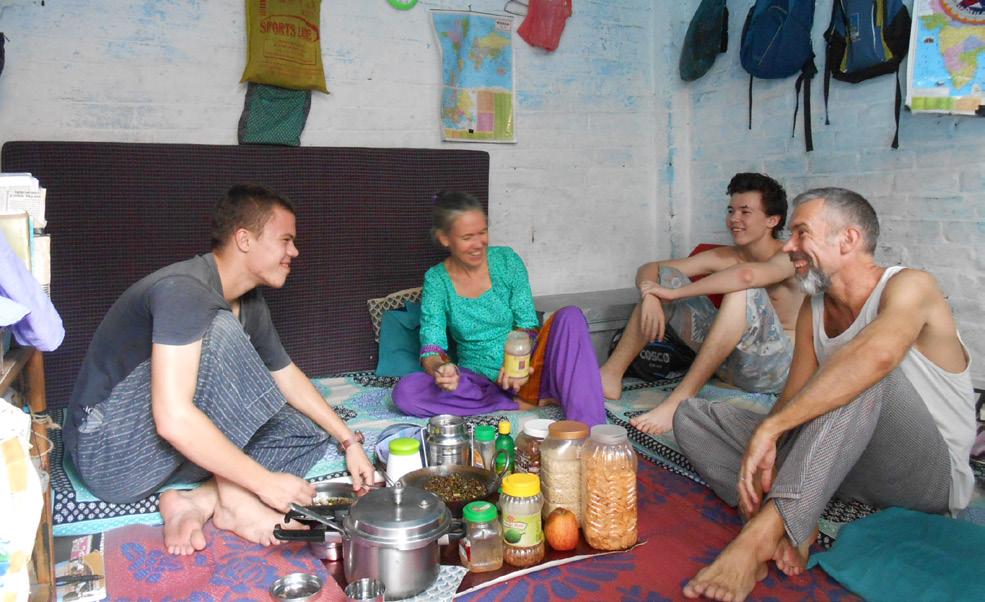
JUNE 2018 11
We share a fairly small room with one fan, one light, and a few electrical devices using little electricity. As do our neighbours
New treatment for ‘silent killer’
Doctor urges Indian community to get tested for Hep C
BY NATASHA JHA BHASKAR
It isn’t like any other day for 27-yearold Harinder (name changed). He has just tested positive for Hepatitis C.
In the days leading up to this diagnosis, he had developed fatigue, anxiety, depression and flu-like symptoms. Despite being treated for these, the problems persisted.
Finally, the doctor suggested that he should take a test for hepatitis C, a viral infection.
“At the moment, 250,000 people in Australia have hepatitis C, excluding the vast majority who don’t even know,” says Dr Puneet Mahindra, a gastroenterologist and hepatologist at Melbourne’s Centre for GI Health.

Not surprising, considering the viral disease rarely displays symptoms apart from general fatigue, if at all. In fact, people with hepatitis can go for decades without showing any signs of having contracted the virus.
“It is a very slow acting virus so unfortunately many people don’t even
realise that they have it – or how they got it,” Dr Mahindra, who sees many patients with hepatitis C, explains. “It is a virus that lives in the blood and affects the liver.

If left untreated it can lead to serious liver disease or liver cancer. Unfortunately, those infected might not look or even feel sick till it is very late. That’s why it’s called a ‘silent killer’. Fortunately though, there is a simple test that can tell if you have the virus.”
And luckily for Harinder and some 3,000 others like him in the Indian community, there is a new cure in the form of tablets.
Hepatitis C is inflammation of the liver caused by the hepatitis C virus (HCV). It is a blood borne-disease and spreads through contact with infected blood.
HCV does not spread by sneezing, hugging, coughing, food or water, sharing eating utensils or drinking glasses, or casual contact.
“Most people get infected through blood transfusion,” says Dr Mahindra.
“A patient of mine contracted it after a cosmetic surgery procedure performed overseas. It was possibly a result of improper sterilisation of surgical equipment.”
The doctor adds that the numbers of hepatitis C patients are highest in the
Indian and Vietnamese community. “Many were unaware of the virus because they were not tested for it in India. The blood transfusions were never tested for Hepatitis C before the 1990s. A lot of developing countries like India and Vietnam did not really start till quite late. In India, there are professional blood donors, who donate blood for money. Many of them have a history of IV drug use, and they have donated blood to multiple people.”
Then there’s the lack of awareness and the general stigma surrounding liver disease. “People don’t seek help until it is really late,” he laments, adding, “I encourage the community to get tested.”
Luckily, general practitioners in Australia are now able to prescribe drugs to treat hepatitis C.
“The new treatments which involves tablets have virtually no side effects and have an efficiency of 95-99%,” Dr Mahindra says.
The simple, safe and effective cure is affordable as it is listed on the government’s Pharmaceutical Benefits Scheme (PBS).
Dr Mahindra advises, “If you have undergone medical or dental procedures overseas, or have received blood products
or transfusions in your country of origin at a time when screening of blood for viruses was not undertaken or was poorly regulated, then get tested. Even if you don’t have any symptoms, just get yourself checked.”
See your doctor or call the National Hepatitis information line 1800 437 222.
FACTS
> Hepatitis C virus is transmitted through contact with the blood of an infected person.
> It can be treated using antiviral medicines
> There is currently no vaccine for hepatitis C
> Avoid: Unnecessary and unsafe injections, unsafe blood products, drugs and sharing injection equipment, sharing items like razors that could possibly be contaminated with infected blood, tattoos, piercing and acupuncture performed with contaminated equipment
12 JUNE 2018 www.indianlink.com.au
HEALTH
Dr Puneet Mahindra
Patching up broken hearts
Young scientist presents a new way to repair damaged heart muscles
BY RAJNI ANAND LUTHRA

Monash University PhD student Muthu Vignesh Vellayappan has taken out the Audience Choice Award at the recently concluded science communication contest FameLab.


He was one of 12 finalists who shared their science stories at the 2018 National Final held in Perth.
His presentation, based on his own research, was about new treatments for heart disease.
FameLab is a science communication competition that seeks out young scientists and researchers keen to give their work a wider reach. It requires them to make a three-minute presentation in a compelling way, to a lay audience. The use of Powerpoints - or even scientific jargon - is not permitted: all they have at their disposal is charisma and clarity.
Talking about his work, Muthu told Indian Link, “Heart disease affects 1 in 6 Australians, and kills 1 person every 12 minutes. Heart transplants remain the only definitive treatment, but donors are limited and most patients die while waiting for a transplant.”
There are two other techniques of treatment to replace the 2-3 million heart cells are damaged in each heart attack. Both techniques however, have their shortcomings, Muthu recounted.
“In one procedure, heart muscles are
injected into the damaged region, but the problem is they don’t stay put in the affected region and are known to migrate. In another technique, a patch, a kind of Bandaid containing heart muscle cells, is applied to the effected region, but the issue here is that the patch doesn’t align effectively enough with the damaged parts, leading to poor healing.”
His own work deals with overcoming the shortcomings in these regeneration techniques.
“My research involves the design and development of material that can be used as the patch. Specifically, the patch must have grooves on its surface so that it can snuggle along the groves of the surface of the heart, align effectively and seal the damaged region.”
Hence the name ‘Groovy Patches’ for Muthu’s FameLab presentation.
Currently in his second year of PhD at Monash University’s Materials Science and Engineering Department, the 29-year-old has so far has successfully 3-D printed the material to be used as the new and improved patch.
“I am in collaboration with polymer scientists in France to prepare the grooves on it. Once these are developed, I hope to test it on rat heart muscle cells to see how they respond.”
To make his FameLab presentation ‘groovy’, Muthu used a heart pillow and an empty syringe and bandages to show the methods of treatment currently used.
“I was pretty nervous but the audience seemed to love it and that boosted my confidence. They responded to each line I spoke, indicating that they understood, and I am so thankful to them. It was their
polling, as well as the polling from an international live stream audience that got me my award.”
The Madurai lad finished his Bachelor’s degree in India and took a Masters’ degree in Malaysia before joining Monash just over a year ago.
“FameLab has been a rewarding experience,” he revealed. “I put in my application without knowing much about it and got through the state level. After that, the training by international trainers and communicators was simply wonderful and I felt as though I improved considerably. I took feedback from friends, colleagues and supervisors and prepared some 30 versions of my script and multiple YouTube videos, optimising till the end.”
He added, “Listening to the other participants was fascinating. Networking with other early career scientists broadened
my horizons and reinforced to me that science can be impactful to people’s lives and meaningful to society, but also interesting and intriguing in itself.”
Muthu has been a science geek since childhood. “Science has always fascinated me, and I realise now, looking back, that science communication has been an inherent passion. Even as a young kid, I loved looking up science facts such as why is the sky blue and not any other colour. And I wouldn’t stop there, I’d actually tell my friends about it at play.”
He seems like a perfect fit for a contest like FameLab. The largest science competition in the world, some 7000 early career scientists from the world over have participated so far. With partnerships with British Council, NASA and CERN, it has been going for 12 years now and has attracted participation from 30 countries.
JUNE 2018 13
SCIENCE
Muthu Vellayappan with other winners at FameLab
Ramadan reflections
This issue we ask the question: what does Ramadan fasting mean to you, and how do you manage it with your work/study routine?
Beheshta Wasseh Sydney
I love Ramadan as it brings the family together for a meal. Everyone is so busy with their daily lives, but we make sure to break our fast together. Fasting isn’t too bad as iftar is just before 5.00pm, better than Germany where the sun sets after 9.00pm! I’m grateful for the short days as this year Ramadan has fallen near the busy exam period at university. It’s funny when I’m fasting and my friends don’t want to eat in front of me, as the whole point of Ramadan is to experience the hunger that less fortunate people face. It definitely makes me appreciate how fortunate we are to always have food and water on the table.
Nayna Pinata Sydney
I work full-time in a pretty hectic and reactive environment and get pulled in all different directions throughout the day. My workplace is quite flexible and open to different cultural and religious commitments. Outside of Ramadan I usually start around 8.30am and finish by 6.00pm. However during Ramadan I organise with my team to start around 6:30 – 7.00am. I wake up for sehri (suhur for some) and instead of going back to sleep I head to work. I finish work around 3.30pm which thankfully gives me enough time to make it home for iftar with the family. My team makes
sure our meetings are scheduled around my Ramadan times and I also get the opportunity to work from home some days. As a thank you, I bring them a ginormous platter of biryani after Eid!
Shafeen Mustaq Canberra
Luckily this year in Australia fasting is quite short - 11.5 hours, most of which is spent at work where I don’t feel it unless someone’s eating something particularly fragrant! Fasting in Ramadan has such a focus on detoxing and learning more about the Islam that it is easy to work, play, pray and even organise charity iftars and dinners to raise funds for those in need.
Our charity in Canberra called Sitara’s Story is raising funds for mental health awareness among Bangladesh youth to address suicide rates. Collective humanity is what gives me purpose and drives balance in Ramadan.
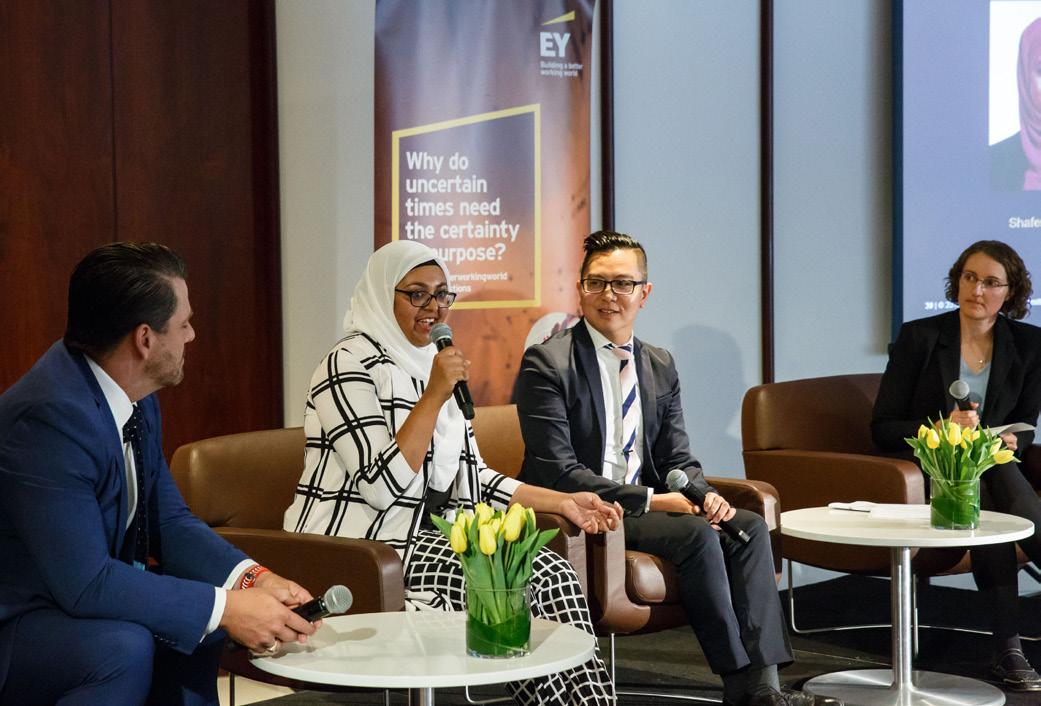
Nadeem Ahmed Sydney
During Ramadan, we wake up for sehri before dawn, then pray and then head straight to work. I have very supportive employers. They give me flexibility to leave early so that I can be home it time for iftar, and allowing time for prayers is great. As an employee, I feel much more motivated and content with
14 JUNE 2018 www.indianlink.com.au FESTIVAL
Management Consultant
Shafeen Mustaq talks about the importance of cultural awareness at work and other forums
the job. Once I’m back home for iftar, it’s time to be with family. I love the bhajiyas, kebabs, tandoori, and the list goes on! I also love the food at Lakemba streets. Personally, Ramadan is an opportunity to stop, pause, think and reflect on my actions, my deeds especially in this fast-paced, materialistic life we liverunning around jobs, money, stressing about little things in life which we don’t have control on. Ramadan is not just about not eating or not drinking. It’s about your whole being, how you live, behave and act. I try my best for all of these, do a spot of charity, fast, pray, try to abstain from all my bad habits.
Zainab Farouk Canberra


I love how Ramadan is a spiritual, mental and physical detox where I work on my soul, thoughts and body! I love that Ramadan makes me reflect on myself and my surroundings. In this world of comparison, consumerism and social media I lose touch with what’s important in life. Ramadan forces me to realign myself with what’s important in life and reflect on my connection with God, family, friends, my community and others in this world. It’s not always easy, but I come out of this month ready to take on another year of improving myself spiritually, mentally and physically.
Faiaz Faruque Sydney

During Ramadan I get to work a bit earlier so I can get home in time for iftar and prayer. I take the travel time to and from work to make my daily dua and reflect on all the things I’m grateful for. I also make time to socialise!
Tasneem Sydney
As a child, I was taught that Ramadan is the month of Allah – a spiritual month of forgiveness, charity and prayers. Whatever you desire in life, if you ask for during this month, Allah will make it happen. Fast forward to today, and I still uphold these values. It is also a month of togetherness; we come together to pray, break bread, and share our Ramadan experiences.
Salma Shah Sydney
Health reasons have prevented me from fasting in recent years. However, during Ramadan, I ensure that I remain extra mindful about what roza means, and I try particularly hard to live the values of Ramadan. For example, I ensure that my meals are much smaller portions, and that I don’t continually snack during the day. I try my best to ensure that clean eating is pivotal to my daily routine, so I ensure my food is ethically sourced. At the end of the day, I don’t binge eat - as the purpose of Ramadan is to demonstrate moderation. I
try to temper my thoughts and behaviour to ensure that I am charitable in my thoughts and deeds. Sometimes I fail, but the important thing is to keep trying. And during the day, I focus on how blessed my life really is - and I make a point of buying a colleague lunch, or I bring in fruit for the cleaners at work.
Shehnaz Akhtar Melbourne

I believe in observing all the rituals as per our tradition. I wake up very early and try to get my children to do the same. I then complete the wuzu, sahoor and recite my tahajjud prayer. I try not to sleep as that defeats the purpose - you are meant to experience the hunger, and sleeping makes it easier. I pray most of the day as this is the time to connect to Allah Miya with full devotion. I do all the five namaaz and try to avoid spending time on recreational things like socialising or watching TV as this is time to pray. I break my fast at sunset with dates, fruit chaat and sherbat My family looks forward to the pakoras (fritters) that are cooked at our place during Ramadan.
It has been scientifically proven that detoxing the human body for a month is beneficial to health and we Muslims have been doing this for hundreds of years. My children have all been raised to observe Ramadan fasting and they all continue to do so as adults. This is a very special time for my family and me.
JUNE 2018 15 Nadeem Ahmed
Tasneem
It has been scientifically proven that detoxing the human body for a month is beneficial to health and we Muslims have been doing this for hundreds of years Shehnaz Akhtar
Shehnaz Akhtar
Beheshta Wasseh
Surgeon wields the palette knife
For Dr Sam Gu e , picking up a paintbrush comes as naturally as picking up a surgical instrument
 BY AVI CHANDIOK
BY AVI CHANDIOK
It’s not unusual to find medical doctors having a symbiotic relationship with the arts. For Dr Sam Gue, painting is the art form he has been drawn to over the years. He grew up in Rewa, UP, and studied Obstetrics and Gynaecology in India before heading off to the UK to pursue surgery.
Eventually, he moved to Broken Hill as a consultant. During his practice in the Australian outback, Gue met one of the ‘Brushmen of the Bush’, Jack Absalom. “I operated on him one time and since then, we became really good friends,” says Gue. “He’s the one who introduced me to the basics of painting.” Bush artists taught him how to stretch a canvas and put on the first coat of white paint but other than that he is entirely self-taught.

As I sit in his lounge room my eyes are drawn to his paintings hanging all around us. He muses, “Despite a busy life I took up painting, and it went on to became my second love. It helped me to relax from the busy, 24-hours-a-day arduous demands of surgery that can be quite stressful.”
Many of the paintings have a story behind them. Some paintings are Gue’s purely personal interpretations of mythical and historical stories from India, some are landscapes and others are seascapes. One painting, for instance, is a result of his journey by train on the Indian Pacific to attend a conference in Perth. He was struck by the beauty of the stark and harsh bush landscape and claims it intrigued him to no end. “After falling in love with the red earth and blue bushes, I never had the opportunity to spend as much time with my favourite surrounds as I’d have liked. But I can reflect on my work as if I am still in those peaceful surrounds.”
Surprisingly, Gue prefers oil colours to watercolours despite the ease of the latter. For the doctor, the complexity and
challenge of painting in oils brings its own reward. “My oil paintings are layered with a palette knife to get a 3-D effect. I can build it up,” he explains, disarmingly admitting that it is easier to cover up mistakes or changes of mind as “you can just paint over them”.
His painting Father Showing his Daughter their Land gives me a peek into Gue’s closeness to his Aboriginal friends. Bungle Bungles with Wild Flowers and Billabong is a delightful and stylised depiction of this World Heritage Site. And the Barrier Reef - Turtles, Colourful Fish, Sea Horse, living in Harmony is a good example of his versatility.
In March, Gue even held an exhibition of his oil paintings at the Royal Australasian College of Surgeons Building in Adelaide. The chief guest at the exhibition was His Excellency Hieu Van Le, the Governor of South Australia.

When asked if paintings show the soul of the artist, Gue pauses for a moment before replying, “You put everything you have in your painting. I start painting and
I forget everything.”
Undoubtedly, his patients will remember him for his surgical work and others for the memories and pleasure they get from his unique paintings.
16 JUNE 2018 www.indianlink.com.au
ART





JUNE 2018 17
Feeling the Forgotten
A floral tribute to a lost generation at VIVID Sydney 2018
BY RAJNI ANAND LUTHRA
Afield of illuminated and dancing water lillies, the installation Oasis has been drawing crowds at Sydney’s Royal Botanic Gardens as part of the ongoing VIVID Festival.

It is created at the site of NSW’s permanent memorial to the Forgotten Australians, on the water feature known as Twin Ponds.
A stone plinth erected here in 2009, reads:
In this place, we remember the many thousands of NSW children who grew up in care in the decades leading up to the 1990s – in orphanages, in Children’s Homes and foster homes, in institutions. We remember the lonely, the frightened, the lost, the abused – those who never knew the joy of a loving family, who suffered too often at the
hands of a system meant to provide for their safety and wellbeing. We rejoice in their courage and strength.
The site of this lasting memorial is currently home to another – albeit temporary - tribute to those who experienced out-of-home care. The ‘lillies’ light up to piped music, and illuminate the trees above. Artificial mist adds a touch of mystery.
Created by Gunjit Kaur, James Feng and Minh Au, Oasis aims to bring out of the shadows, the experiences of Forgotten children. The neglect and abuse they faced, as well as the strength and resilience that emerged, are at the core of this work of art.
Describing the installation, Gunjit told Indian Link, “Each individual flower is a slender pipe holding a bulb. It is fragile enough to sway in the wind, but strong enough not to fall over.”
In some ways, the slender pipe also evokes the ‘thread’ that is a significant part of the Western Australian memorial to the Forgotten Australians: There is a strong thread that links the way a child is raised with the person they become in adulthood.
This memorial stands as a reminder of that thread to all who create policies that affect children.
The music for Oasis was painstakingly picked, James revealed. “There are elements of loneliness, fear, anxiety and neglect in our musical selections, as well as of joyful play in the natural environment, such as where this installation is set.”
The 20-minute mix is made up of bits from popular as well as classical music, and snippets from TV and radio shows.
The end is beautifully soothing, in the hope that there is some resolution, perhaps even peace.
And that, in essence, is the aim of this evocative piece – for viewers to experience a variety of feelings as they are urged to get into the shoes of a ‘lost’ generation of kids.
It wasn’t until 2009 that care-leavers received some solace when the then Prime Minister of Australia Kevin Rudd issued a statement of acknowledgement and apology in Parliament for their maltreatment. Today there are legal and social support services available for them and their families.
Gunjit met her artist-colleagues James and Minh at uni, where she studied architecture and engineering. The trio hope to work on other creative projects in the future.
Work on Oasis commenced late last year, she revealed, as the core team sussed out the site.

“The individual units, and there are 600 of them, were created at a warehouse,” she recounted. “The base of each flower is a glass bottle filled with sand and water, and weighing 7 kg. Yes, there was a fair bit of weight lifting to be done when they were all transported to the site!”
The bulk of the work took place in the nearly two weeks of assembly. And yet, Gunjit added, the challenges continued on location. Overnight, as installation was underway, ducks flew in and tried to land in the pool, knocking over 200 of the bottles.
“It was quite stressful and I wondered at one stage whether it would all come together, we were so tight on time. It took some quick thinking on our feet, not to mention great support from the organisers, to see us through!”
18 JUNE 2018 www.indianlink.com.au
ART





JUNE 2018 19
Photos: William Wei
WhatsApp battleground for India elections 2019
BY PAWAN LUTHRA
In just under a year, India will go to the polls with its next general elections.
Last time round in 2014, there was much excitement in the lead up to the elections due to the expected dominance of the Bharatiya Janata Party over the Congress. For the first time then, the major political parties used social media as a tool to attract voters, spending between 2-5% of their electioneering budgets in this sphere. Market research companies have set the amounts at INR 500 crores (AUD $100 million) and INR 400 crores (AUD $80 million), respectively.
This spend will be vastly increased as younger voters join the electoral rolls. Observers have noted that Prime Minister Narendra Modi, a clever user of social media, has already reached out to this new electoral bank. In 2017, when he delivered his shortest Independence Day speech from the ramparts of the Red Fort, it might well have been directed to a generation
whose attention span is shorter and lifespan longer than its predecessor. His eye might have been set on those born between 1997 and 2001. In the 2019 Look Sabha polls, these very individuals will be exercising their voting rights for the first time in a parliamentary election.
Modi had said then, “January 1, 2018 will not be an ordinary day – those born in this century will start turning 18. For these people, this is a decisive year of their lives.” While the traditional rallies and loudspeakers, posters and banners will still be at play, it is expected that social media will play a large part to woo voters and also turn them away from the opposing party.
Though more than half of India’s population still does not have access to the internet, India is considered to be among the top five countries in terms of growth of the internet users. It is estimated that India has 462 million active internet users, of which 153 million are active social media users. The active social media users are growing at about 23% per year, with WhatsApp being the platform experiencing the strongest growth, followed by YouTube and Facebook.
With over 200 million users, it is believed that 13.7 billion WhatsApp messages are



MATRIMONIALS
SEEKING GROOMS
Alliance invited for a Hindu-Khatri never married girl, 5’3”, born December 1985. Beautiful, slim, fair, vegetarian. Pursuing PhD in India. Presently in Melbourne at brother’s place. Seeks well settled and educated match in Australia. Whatsapp or call +61 466 984 747, or email 16618k@gmail.com
Match required for a 34-year-old girl Hindu Punjabi girl. Australian citizen, 5’4”, slim and attractive. Never married. Holds a post-graduate degree in multi-media, working in Digital Marketing. Family well-settled in Sydney. Please respond with photos and details to simplepuja2018@hotmail.com


Professional Punjabi Hindu Khatri match for our 26-year-old Australian born, Sydney-settled, vegetarian, law graduate, 5’5”, fair and slim daughter. Please email details to nmatrimonial@yahoo.com
Suitable match for Australian citizen, Sydney-based Sikh girl, 1991 born, 5’5”, quali ed chartered accountant, working for Australia’s leading bank. Parents highly educated and well-settled in Sydney. Please respond to hs52216a@gmail. com
SEEKING BRIDES
Indian Christian Protestant parents seeking a suitable match for their 38-year-old son, software engineer, born and brought up in Australia. Seeking Protestant girl aged 28-34 years. Email: sammy5073@gmail.com or call on 0403 836 360
Seeking alliance for turbaned Sikh Arora boy, 1987 born, 5’8”, highly quali ed IT network analyst working with top IT rm in Sydney. Parents well educated, mum runs her business and elder brother settled in Sydney. Call on 0401 855 488

Are you looking for ‘the one’?
List your matrimonial with Indian Link!


sales@indianlink.com.au

or phone (02) 9279 2004


sent every day. In fact, Indians alone accounted for other more than 20 billion New Year’s Eve greetings set via WhatsApp this year.
In the recently concluded state elections in Karnataka, it is claimed that the two major parties reached 1.5 million followers via 20,000 WhatsApp groups. These elections are being called the ‘WhatsApp First elections’ and the take up of this platform while surprising to many, was not fully unexpected.
Using this platform as a way to spread information - which cannot be verified, which can go viral easily, and which is spread between small groups multiplied by millions - is every political party’s dream of planting incorrect information if they so wish to do. Fact checking is difficult to do and because WhatsApp is such a closed
channel, with all messages encrypted between senders, determining the source of false and misleading messages is nearly impossible.

While the social media platforms are developing well, the traditional print media is also strong in India with increasing circulations. In the next election cycle, they will have an important role to play as they report upon and analyse the politics of the nation.

20 JUNE 2018 www.indianlink.com.au
OPINION
INDIAN LINK SOCIAL MEDIA subscribe to our channel /IndianLinkAustralia @indian_link /IndianLinkAustralia
Bookshelf
A quick glance at what’s hot off the press in India
THE LAST WORD

by Rahul Bedi (Publisher: Roli)
This is an anthology of 100 obituaries written by journalist Rahul Bedi. Published between 1990 and 2008 in the The Independent and Daily Telegraph, the collection ranges from obits written for people like Harkishan Singh Surjeet to Minoo Masani, and from Morarji Desai to Vijayalakshmi Pandit.

These obituaries celebrate the extraordinary life of people who have changed the idea of India. Many of these were young professionals, politicians, film actors, writers, musicians or scientists when India got Independence and have played a crucial role in their fields of work.
PRIME TIME CRIME by Vrushali Telang
(Publisher: Vishwakarma)
Within a month of joining City-news, Ritka an intern manages to get an exclusive TV interview with sophisticated gangster A.T., the recent crime sensation. During the interview Ritika and A.T find themselves getting attracted to one another. Soon they share a torrid chemistry and find is difficult to stay away from each other. Does A.T love Ritika, or is he using her as a pawn for a dangerous plot?
Did he manipulate circumstances so that only she could get through to him? Does Ritika love A.T or is she playing along in order to get leads for investigative crime stories? Is she out to catapult her career from an unknown intern with a local network to being a star reporter with a national news channel? Set against the backdrop of Mumbai underworld in 1999, Prime Time Crime is a story about a relationship that is ruthless, passionate
and manipulative.
A story that stinks of lies, deceit and death. Did they ever, even if it was for a moment, truly love each other? Are relationships as honest as we’d like them to be? In the unholy nexus of mafia and news media who can you trust? With vibrant characters, razor sharp plot that moves at breakneck speed, this book is an overpowering love story that will hunt you for long.
their wishes.
Then, a polo accident leaves him nearly paralysed below the hip and turns his life topsy turvy. As he struggles to return to a semblance of normalcy, his efforts bring him into contact with an Ayurvedic centre in Sharjah. The head of the treatment centre is a beautiful ascetic, Ritambhara Devi, and Shaquille falls in love with her. To everyone’s surprise, she reciprocates his feelings.
MY HUSBAND AND OTHER ANIMALS by
(Publisher: Westland)

 Janaki Lenin
Janaki Lenin
With this compilation, the author returns with more stories of the quirky and wonderful life she shares with her husband, Rom Whitaker, and an array of wild creatures-from leopards to king cobras. Janaki’s enthusiasm and passion for the wild finds a voice in the pages of her book, while her curiosity about the world she inhabits infuses these lighted-hearted, yet thought-provoking stories with unique insight.
As much a chronicle of Janaki and Rom’s unusual life as it is a wild and eventful journey, My Husband and Other Animals 2: Wildlife Adventure Continues is a witty, delightful read.

LOVE KNOWS NO BOUNDARIES by
 Sujay Kantawala
Sujay Kantawala
(Publisher: pblishing)
As the son of a State Governor in Chad, Sayed Shaquille Ahamat, has little to worry about. However, his family expects him to eventually take over his father’s business, marry a local girl and settle down, and there is a little reason for him not to fulfil
Meanwhile, Ritambhara’s position and responsibilities elevate constantly at the Swami Samarthanand Ashram where she has lived since childhood. She will not give up her country, her religion and her Guruji to join Shaquille. Neither is Shaquille willing to forsake his way of life. So, what next?
ALL DOORS OPENED by Inder Sharma
(Publisher: Allied)
This is the story of Inder Sharma, the canny creator of SITA World Travel India, the towering giant of India’s travel industry and later the Chairman of India’s most iconic and celebrated shopping centre, Select CITYWALK, as told in his own words.
THE TALE OF TWO COUNTRIES by B.K. Karkra
(Publisher: Rupa)
“The outside environment seemed to have completely overshadowed his genes. He was getting more and more Anglicised with every passing year and almost felt embarrassed of being the son of his parents. He felt that they were out of tune with life in Britain...”
Having survived the horrors of Partition, young lovers Guru and Sukhi begin a journey of blissful matrimony. Supporting
each other through the various ups and downs of life, they migrate to England, start a business and see the birth of their only child, Gursukh, in due course. Everything seems perfect, yet the couple makes one last journey back to India. What makes them take this journey? Weaving history with fiction, this is a moving saga of a family and as well as a commentary on the lives of hundreds like the Grewals who, lured by life abroad, take the plunge, and have to deal with both the pressure to make good in an alien land as well as the longing for the motherland left behind.
EARTH REPUBLIC: Chatter From The Capital’s Cauldron (And Beyond) by V. Shruti Devi
(Publisher: Notion Press)
This is a collection of 10 free-wheeling articles written in conversational style, verging on the informally careless. The potpourri of commentaries on theatre, sports, food, agriculture, world politics, Bruce Springsteen, Imran Khan, women’s rights, world peace, people’s belief systems, the right to privacy judgement -- all with the flavour of New Delhi, right up to the present-day NCR, with tribal India and outer space forming a billowing backdrop for the grand production that is the Republic of Earth.

Earth Republic brings to the recliner, as well as to the office-desk-trying-to-lookbusy, thoughts from time and space, and last night’s rally at the mantle-piece. It is an invitation to forge reality and rattle the galaxy, all in one pranayamayoga clarion call.
IANS
JUNE 2018 21
BOOKS











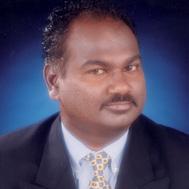
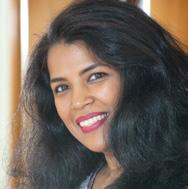







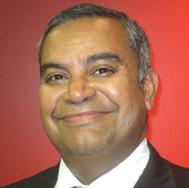


22 JUNE 2018 www.indianlink.com.au Phone Safari Mail Camera Anup Neelam Raghu Manoj Kashif Sagar Radio Rishabh Pavitra Priyanka Charuta Pawan INDIAN INDIAN LINK RADIO Download the free App Now
Walnut wonder
The cold season is upon us and what better than walnuts for some warmth? Not only are they tasty (Hello, chocolate walnut cake!) but this brain boosting nut is high on Omega-3 (to keep that ticker of yours fit as a fiddle), Vitamin E and antioxidants. Have them raw, chuck them in a salad, or try the recipes here. They come from award-winning chef Sabyasachi Gorai, former Director of Kitchens at India’s popular food chain Olive Bar & Kitchen.
EGGPLANT WALNUT APPETISER DIP
Ingredients
1 eggplant
1 tbsp olive oil
3 cloves garlic
1 cup California walnuts
1/3 cup fresh at-leaf Italian parsley
Zest of one lemon
1 tbsp lemon juice
1 tbsp honey
1/2 tsp salt
1/4 tsp pepper
Method
Preheat oven to 218 degrees Celsius. Cut the eggplant in half, and brush with olive oil. Place on baking sheet. Make a small packet of aluminium foil to hold the garlic cloves and the remaining oil; place alongside eggplant. Bake for 35 minutes.
Place walnuts on another baking sheet.
Toast ve-10 minutes or until lightly browned.
Once the eggplant has nished roasting, allow to cool down a bit, then scoop the esh of the eggplant from the skin. Discard the skin.
Combine walnuts and parsley in food processor; chop. Add lemon zest, lemon juice, honey, roasted eggplant and garlic, and salt and pepper to taste. Blend in the food processor until smooth.
Serve with pita bread.
SWEET WALNUT BRIOUATS
Ingredients
200 gm California walnuts

70 gm sugar
1 tsp cinnamon
Zest of an orange
250 gm liquid honey
100 ml water
2 tbsp orange ower water
16 lo pastry sheets
50 gm liquid butter
Method:
Use a mixer to chop the walnuts nely. Mix with sugar, cinnamon, and orange zest and set aside. For the syrup add honey and water in a pot and bring to a boil. Let simmer for two minutes, remove from heat and let cool. Add the orange ower water once the syrup has cooled.
Preheat the oven to 150 degree Celsius (gas: level 1, convection: 130 degree Celsius). Remove the lo pastry sheets from the package, leave them as a stack, and brush each upper one with melted butter. Place the walnut mass along the narrow side of the pastry, leaving two-three cm space in between.
Roll up the pastry sheets and fold the ends to prevent the lling from running out. Repeat this step for each pastry sheet. Place the rolls on a baking sheet lined with baking paper and brush with the remaining melted butter. Bake for ca. 25 minutes until they are golden brown. Pour over the warm syrup and serve.
POMEGRANATE GLAZED CHICKEN WITH CALIFORNIA WALNUT AND POMEGRANATE COUSCOUS
Ingredients
For the chicken:
1 tbsp sumac
1 large clove of garlic, minced
1 tbsp olive oil
A pinch of salt and pepper
4 chicken thighs, bone in and skin on 60ml pomegranate molasses
For the couscous:
160 gm couscous
30 ml extra virgin olive oil
20 ml lemon juice
10 ml pomegranate molasses
Small bunch of at leaf parsley, roughly chopped
Small bunch of mint, roughly chopped
Seeds from half a pomegranate
80 gm California walnuts, toasted and roughly chopped
Method
Mix the garlic, sumac and olive oil, season with the salt and pepper and massage into the chicken thighs. Leave to marinate for at least one hour. Once marinated, place the chicken thighs on a barbeque over medium hot coals.
After 10 minutes, brush the chicken with the 50ml of pomegranate molasses, continue cooking until sticky and glazed on the outside and cooked right through on the inside. Cook the couscous as per the packet instructions. Meanwhile, whisk together the extra virgin olive oil, lemon juice and 10 ml of molasses. Mix into the couscous along with the pomegranate seeds, fresh herbs and walnuts. Serve alongside the chicken.
JUNE 2018 23
FOOD
cineTALK ENTERTAINMENT







































































































































































































































































































ick (for the want of a better genre description) are not all seen to be chauvinistic idiots. Some of them are actually quite interesting. The nameless guy who follows (stalks?) Sonam’s Avni to every noisy function and even gets her into bed (and even gives her her rst big ‘O’, we are told) is so loud and cheesy, he is a scream.
Imagine if the drunk Kajol in Dilwale Dulhaniya Le Jayenge had actually woken up in Shah Rukh Khan’s bed after a night of pleasurable sex.
Sonam’s Avni in Veere Di Wedding is in that position. Under the glaring light of pleasure, there is dark sorrow. Though outwardly every character is constantly partying, the hollowness of their existence is felt in throbbing threads of anger and regret.
VEERE DI WEDDING
Director: Shashanka Ghosh

STARRING Kareena Kapoor Khan, Sonam Kapoor Ahuja, Swara Bhasker, Shikha Talsania, Sumeet Vyas
HHHHH




You only live once... right? Best to ll your life with as much festivity and joy as possible. Veere Di Wedding embraces the hollow yet strangely satisfying rituals (for some) of hedonistic living in Delhi’s upper class business community (the kind that Sonam Kapoor has married into) with a rush of fervour that leaves the audience breathless.
The director introduces us to the four childhood friends who grow up into designer glory by the time we settle down in our seats with our popcorn. Then the revelry never stops.
But wait, it’s not only about four

frocked friends frolicking in froth. There are secret sorrows in all of this celebration. Kareena playing Kalindi the quietest, saddest, most confused and the most elegant of the four protagonists, has a distant far-away look in her eyes throughout the lm.
This could either be Kalindi’s aching regret for missing out on a normal family life (her beloved mum passed away and her dad married a giggly airhead played by the wonderful Ekavali Khanna). Or it could just be Kareena wondering if Taimur has had his Cerelac.
The very talented Swara Bhasker as Sakshi is a foul-mouthed, ill-tempered, almost-divorcee, splurging on her wealthy parents’ money while they sit and watch her wedding video wondering where they went wrong. Swara’s Anarkali Of Arrah effortlessly gets into Gucci.
Then there is the almost-unknown Shikha Talsania playing a young obsessive mother married to an understanding compassionate Australian (played by Edward Sonnenblick, the guy in Firangi whom Kapil Sharma kicked). Shikha’s comic timing has to be seen to be believed. Bollywood embraces the other-ness of glamour. And that’s good news for actors like Shikha.
Sonam Kapoor, looking like a million bucks, plays the hoity-toity prudish divorce lawyer looking for some manaction in her parched life. Sonam’s Avni is arid, waiting to be married. Her encounter with a spot of lust with a prospective groom is outrageously funny. Sonam is in splendid form lling that fancy clutch-bag with real emotions. Not easy to do.
Blessedly, the men in this chick
Some of the actors, so busy having a good time, fail to express the tangled mess of troubled unresolved issues that the script raises.
Kareena’s gay uncle (played by Vivek Mushran) and his live-in partner are concessions to tokenism that needed more eshing out. But the narrative is too restless and anxious, too impatient to move to the next level of fun, only to rip the revelry at the seams.
This lm is fun to watch. The quartet of gorgeous women are more entertaining than the four guys in Dil Chahta Hai. One of whom had famously said, “You can’t improve on perfection”.



True, but you can do a lot with imperfection. Especially if you have the wealth to play around with to hide your ongoing bouts of gaffes and faux pas. Veere Di Wedding is one helluva joyride, a designer’s delight and yet not quite the air-headed experience it loudly proclaims itself to be.
 Subhash K. Jha
Subhash K. Jha



























24 JUNE 2018 www.indianlink.com.au
BRIGHT AND BUBBLY… BUT A BIT BEFUDDLED? cheesecake.com.au Present this coupon at your local The Cheesecake Shop any full size cake!* * Offers ends 01/07/2018. Purchase and pick up any full size cake over $26.95 and receive $10 off the purchase price. Offer not available for midi size cake or gluten free cake purchases. Not to be used with any other offer. Only to be used once.
that work in the lm. The lm gets its Mahabharat sinfully wrong too: rstly, the teleserial by B. R. Chopra is shown being aired in 1998, when it concluded on Doordarshan in 1990; the names of the ve Pandavas are used as code names for John and his four colleagues thrown at the vortex of the Pokhran deserts even if it means pissing off the entire government machinery.
GOOD INTENTIONS GONE TO WASTE
With one man (Boman Irani) from the PM’s of ce supporting Ashwat Rana’s mission, India’s nuclear prospects have nothing to fear. With John Abraham playing the rebellious anti-establishment hero hell bent on doing right no matter what the cost, the lm reads more like a Hollywood cop thriller than a faithful chronicle of India’s nuclear makeover in the deserts of Pokhran.
PARMANU: THE STORY OF POKHRAN

STARRING John Abraham, Boman Irani, Anuja Sathe, Diana Penty DIRECTOR Abhishek Sharma
HHHHH
If good intentions make good cinema then every propaganda lm would be a classic. In the absence of a hefty grip and a budget to rev up the key sequences pertaining to India’s historic nuclear explosions Parmanu: The Story Of Pokhran ends up more like a fable of one man’s heroism rather than the saga of a nation that woke up to a nuclear dawn.
The facts are twisted into commercial shapes including a ash point buttonon-the- ngertip climax where the lm’s editor runs with breathless bravado from pillar to post, trying to keep the audience’s interest alive.
But all in vain. Parmanu is like a promised havoc that never goes beyond a wound-up whimper. The lm’s opening shows the bureaucrat-hero Ashwat Rana (John Abraham, starchy and un appable) grappling with a roomful of bored colleagues who are more interested in the samosas than Ashwat’s plans to nuclearize Apna Bharat Mahaan.
It’s an opening paying a direct
homage to Shimit Amin’s Chak De
Throughout John Abraham remains in character, implacably committed to the mission even if it means pissing off his wife (played by Anuja Sathe who was excellent just recently in Blackmail, what happened here?) and even if America gets on the wrong side.
‘America’ is imagined with outrageous tackiness: a bunch of Caucasians (probably tourists picked from the Gateway Of India) sitting in front of obsolete computers monitoring India’s nuclear movements, that’s Uncle Sam watching. Their computers, and one antiquated cellphone, are just about the sum-total of period references
REGULAR GUY AS SUPERHERO
BHAVESH JOSHI SUPERHERO

STARRING: Harshvardhan Kapoor, Priyanshu Painyuli and Ashish Verma;
DIRECTOR: Vikramaditya Motwane
HHHHH
Harshvardhan Kapoor doesn’t play the title role in the lm. Anyone could. This is a lm about pricking awake the conscience, so well-written and so successful in downplaying the image of the typical hero. Anyone could be that prick.
On the other hand, no one really bothers. Why should they when all you get for trying to change the status quo is a death in the gutter? What makes this lm an important testament on the need to make your voice of protest, is the language used to convey that urgent need.
Though wrongly marketed as a superhero lm, Bhavesh Joshi Superhero actually tells us why the cult of superheroism needs to be urgently replaced by a more practical and tenable form of working class heroism.
Hence, Sikandar (Harshvardhan Kapoor) is at rst happy being a pseudoreformist spewing reformatory jargon in smoky pubs until something happens to put him on red alert.
The lm has a slow, steady and solid
build up to a climactic outburst that is so powerfully shot that it leaves us with a sense of foreboding for the hero whose mask peels off to reveal the face of the ordinary man suffering the indignities of a system that allows politicians to eece and ee.
Nishikant Kamat makes a menacing villain. A politician on the corporator’s level who dreams of controlling Mumbai.
What makes Vikramaditya Motwane’s lm on the extraordinary heroism of ordinary people is its relentless statement on unostentatious heroism. Harshvardhan, in a post-debut role that allows him to prove he has the creative chops to carry a role even when cast as a reluctant hero, steps into the heroic mould without losing his sense of ordinariness.
The young actor excels in conveying the helplessness and growing rage of average youngsters who watch the dance of plunder, but this time it is Mumbai’s water supply that plundering politicians desire.
How we look at Sikandar’s efforts to stop the plunder is entirely reliant on how effectively we accept Harshvardhan as an actor who excels in being in a man who won’t give up Anna Hazare’s dream of re-structuring story. Harshavardhan gets ample opportunity to play a character who gets caught in de nitions
of heroism. He is well-supported by two other young actors Pryanshu Painyuli and Ashish Verma who play Harshvardhan’s brothers in arms.
This is a lm that catches us off guard. Its message of social awakening spotlights a lm that is brave and bleak. Shot with a striking sense of the raw and the real, it salutes a wounded
While sections of the lm get unbearably jingoistic, towards midpoint the plot gets absurdly ‘espionaged’.
An immoral spy (who, it turs out, becomes the lm’s most interesting character) from Pakistan named Sajjan snoops into our hero’s hotel room in Pokhran, plants an eavesdropping device and gets Ashwat’s wife to suspect him of in delity. Sadly, it all seems highly improbable and manipulated. By all means, honour the country with ag-waving patriotism, but at least make sure that the lm does not prove unworthy of its nationalistic aspirations.
Subhash K. Jha
civilisation without resorting to the agwaving patriotism of Parmanu. It doesn’t offer instant solutions and homemade remedies against corruption in politics. It tells us all to go out there and try to make a difference.
Just like the producers and director of this lm have done.
Subhash K. Jha
JUNE 2018 25
The BUZZ
DIA MIRZA: WAH, TAJ!

The Taj Mahal might be one of the Seven Wonders of the World, but it’s a wonder that it’s still standing given the relentless pollution around. (Did you know: Agra was declared one of the most polluted cities in India by WHO recently?). Which is probably why the government’s decision to clean up the areas surrounding the monument couldn’t come at a better time. Diya Mirza certainly seems to think so.
RANBIR’S ‘SANJU’ ACT IS SHORT OF BREATH
Everything seems to be a joke in the eagerly awaited trailer of Rajkumar Hirani’s Sanju, based on the life of troubled actor Sanjay Dutt. A cruel joke told in the form of a psychedelic fable replete with visuals of Sanju baba aka Ranbir Kapoor, high on drugs, so high that he can’t tell the difference between a laugh and a cry, or a mangalsutra and a toilet seat.

In a sequence meant to be deafeningly shrill in its hysterical repudiation of a traumatic marriage, Sonam Kapoor Ahuja shrieks for her missing mangalsutra, and her high-as-a-kite husband drapes her neck with a toilet seat.
Toilets occur twice in the longish trailer. Next we see Sanju in a dingy prison cell panicking as the inbuilt toilet vomits yellow liquid excreta in nauseating bubbles.
Realism during the times of surrealism.
The atmosphere is light, uffy, woozy and jokey even in the scenes of horri c torture where Ranbir’s Sanju cracks up after a resounding slap from a policeman interrogating him for his alleged terror activity. It is again an unintentionally funny moment because the real Sanjay Dutt must have cracked up so many times under duress without looking like he has just been caught eating an extra gulab jamun for dessert.
Sanjay’s saga is a chronicle of self-abuse and voluntary destruction. Neither of these aspects is highlighted or even mentioned in the trailer. Barring the small glimpse of Manisha Koirala as Sanjay’s legendary mother Nargis, every actor seems to be in this for the fun of it. Vicky Kaushal, so majestically restrained in Raazi, is specially annoying as Sanju’s sidekick smirking about “say-ex”.
And Paresh Rawal as Sunil Dutt behaves as if his son is an angel targeted by all the devils in the world. This is so wrong. I remember how troubled Sunil was by his son’s antics. Speaking to me, he had called his son a “bigda beta (a brat)” spoilt by his mother. The trailer makes it seems the father blames the world for his son’s troubles.
Everything in the trailer seems to be done for effect. Anushka Sharma (with a specially-cropped haircut to look the part) asks Sanjay how many women he has slept with besides his girlfriends. (Which journalist asks such questions in Mumbai?)
“Does that include prostitutes? 308... no make that 350 just to be on the safe side,” Ranbir’s Sanju deadpans.
The overweening cuteness of an incorrigible hedonist is unbearable to digest.
The only moment that actually had me laughing was when director Mahesh Manjrekar calls Sanjay Dutt, saying the shot is ready. Sanju pretends to be stuck in the traf c.
“But I’ve called you on the landline,” protests Manjrekar with a laugh. That’s it. Everyone - from mum Nargis to friend Manjrekar - laughed off Sanju baba’s wrongdoings.
Judging by the trailer, it seems we’re supposed to do the same.
Subhash K. Jha
Basically, it has been decided that Agra would beat plastic pollution by ending disposable, or single use plastic around the Taj Mahal and make up to 500 metres around the historic monument plastic-free. It’s being called the Taj Declaration.
To which, Dia said, “Taj Mahal and Agra as a city attract tourists from all over the world. As a world heritage site and symbol of love, what we witnessed and we hope (is that) we will convert action on the ground to a signi cant change in the human behaviour.”
Dia added that the pledge is a “powerful example” to the entire world and that she can’t wait to come back and see how it all pans out. We’ve got our ngers crossed too!
SALMAN KHAN: MR CONGENIALITY
No other Khan comes close to the kind of popularity Salman Khan enjoys –neither Shah Rukh nor Aamir. The secret to this popularity is his apparent heart of gold. He is ‘bhai’, after all, and at any given point of time, you will always nd at least one celeb gushing over Sallu. In this case, two of them, Saqib Saleem and Jacqueline Fernandez (his co-stars in Race 3).
While Jacqueline says she feels so intimidated by his aura sometimes that she even forgets her dialogue, she adds, “Once you know him, you realise he is really a nice man with big heart”.
Saqib says Salman has the earned the greatest power there is: the power of people. “I think, as a public gure, I wish to achieve that,” said the actor, talking about how Salman treats everyone with the same respect – whether it’s the director or a spot boy. It’s not easy to see why Salman Khan is Mr. Congeniality.
SWARA BHASKER: HATERS GONNA HATE
She’s pretty much the most talkedabout celebrity out there currently– and why shouldn’t she be? Swara Bhasker always has something to say, but full props to her for always taking it on the chin and giving it back to internet trolls.
The latest uproar around the actor seems to be about her masturbation sequence in the recently released Veere di Wedding. She responded, “I have been targeted by paid trolling in the past and I’m used to it. Many twitter-
users and some prominent comedians and commentators have turned the ‘I took my Grandmother to watch VDW’ into very funny satirical comments. I’m grateful both for their support and their humour.”
She also said that she prefers to ignore people who are petty, hypocritical or those who slut-shame. “Currently I am ignoring these people and feeling very happy with the rest of the team of ‘Veere Di Wedding’ about the success of the lm.”
You go, girl!
VEERE DI WEDDING: NEXT BIG THING?
Veere di Wedding was possibly one of the most highly-anticipated lms of this year, and although it’s too soon to tell whether it’s a commercial hit, one thing is for sure: everyone’s talking about it. Whether it was Bebo’s return to the big screen after turning mum, Sonam Kapoor Ahuja’s return after her wedding or Swara Bhasker’s drastically different character from her usuals, everyone was curious about it. Producer Rhea Kapoor, in fact, believes that it has the potential to break the glass ceiling. “Calling the lm a chick ick would put it in a bracket. At a juncture where we are trying to break away from labels, it’s high time we had a lm that doesn’t judge women and at the same time is aspirational,” Rhea said.
Yes to that, Rhea. Our recent review, however, suggested that it’s a fun lm to watch with your girlfriends, but misses some much-needed depth in some places. So it may not be a chick ick exactly, but… glass ceiling? Ho-hum.
SUSHANT SINGH RAJPUT: THE REAL BAAZIGAR
We all know that dialogue, don’t we?
Haar ke baazi jeetne wale ko baazigar kehte hain. Well, guess who loves to fail? Sushant Singh Rajput, that’s who! Ok, not exactly. Apparently, Sushant loves to take up roles that he thinks he’ll fail. Why?
“It becomes like a challenge for me to outdo myself. My philosophy of success in life is to nd different ways of failing, I would fail three to four times but the fth time when I succeed it would be my personal experience, it would help me emerge as a person,” says the actor. Well, perhaps there’s some logic to this.
26 JUNE 2018 www.indianlink.com.au
U P-TO-DATE NEWS ON WHAT’S HOT AND HAPPENING IN BOLLYWOOD
ENTERTAINMENT
DIA MIRZA
SUSHANT SINGH-RAJPUT

After all, he’s had to really work for his career – his lms like Kai Po Che! and
M.S. Dhoni: The Untold Story didn’t really break the box of ce (they did get him plenty of critical acclaim, though).
“Bollywood has taught me a lot, mostly that failure is just a way of pushing myself to do more and more and better myself with every new project that comes my way,” he said.
And one can’t deny it, the lad’s getting better with every lm he does.
STATE OF THE INDUSTRY REPORT
Ask Big B and he will tell you, the state of the nation, er industry, is strong.

He’s talking about the lm business of course. And the rest of the industry wallahs, as well as the rest of the nation, will take his word at face value.
In a recent blog entry, the 75-yearold cine icon ruminated about current trends, and gave it all a considered highve.

“Story telling is so impressive these days that never before has there been such an acceptance to the variety of lms being made today,” he wrote.
There are large budgeted lms, small lms, fantasy lms and real lms, he listed, and observed that they all have a value at the box-of ce.
The audience has matured, he said, having developed a discerning attitude towards good and bad lms, and are not afraid to express themselves “in
volumes”.
As for the current crop of lm-makers, “Competition is strong, (processes) are tedious, and the creative ideas are the very best.”
He concluded, “A moment of pride in our little world - a world that has always been the horse to be whipped but we are a strong world and we shall continue to survive and ght.”
He should know. At his age, he has just come off a major hit 102 Not Out and is working on two other big ones, Ayan Mukherjee’s Brahmastra and a Sujoy Ghosh project.
We hear you, Amitji.
Nickelodeon, Sony, Universal, BBC, and Paramount.
Here’s hoping some wonderful stuff comes out of the collaboration.
WORTH WAITING FOR? YOU DECIDE!
Haathi Mere Saathi, an animal drama featuring Rana Daggubati, Pulkit Samrat, Vishnu Vishal, Zoya Hussein and Kalki Koechlin, is currently in production

The lm is a trilingual, lmed simultaneously in Hindi, Tamil (as Kaadan) and in Telugu (as Aranya). A different cast features across languages.
NAMASTE,
INDIA: YELLOW WIGGLE GREG PAGE

Yellow Entertainment, the company of Wiggles founder Greg Page will soon be producing kids’ entertainment in India. In a partnership with India’s Toonz Media Group, it will co-develop and coproduce a preschool animated series for global distribution.
Yellow Entertainment will handle preproduction, including IP creation, scripts, and music, while Toonz will lead all other aspects of production.
Headquartered in Technopark in Thiruvananthapuram, Toonz, through its state-of-the-art animation studio, has produced numerous successful kids and family entertainment brands through its global production partnerships with companies including Disney, Turner,
The movie highlights man-animal relationship is a story inspired by true events and a tribute to 1971 classic lm Haathi Mere Saathi starring Rajesh Khanna and Tanuja.
“The movie brings me back to one of my favourite subjects – elephants,” director Prabhu Solomon said about the lm.
The lm is currently on location in Thailand and Kerala.

Meanwhile, director Sujoy Ghosh reunites the Pink pairing of Tapsee Pannu and Amitabh Bachchan again in his tentatively titled Badlaa. Apparently a murder mystery, it was meant to have had the Ghosh favourite Vidya Balan in it…. Oh, and a second major male lead, possibly Naseeruddin Shah!
ON TWITTER THIS WEEK
Match the stars to their tweets: Salman Khan, Karan Johar, Swara Bhasker, Farhan Akhtar
There are heroes in this lm. They are female. It’s unfortunate that the word ‘hero’ evolved to be masculine given that it’s actually gender neutral.
N this is my childhood frnd Iqbal, as a teen he was my bank, I still owe him 2011rs . thnk God he did not take interest.
My regard for & goodwill towards the people of #Pakistan remains unchanged. Some of my closest friends are Pakistani. Lahore remains one of my soul cities.
Love you so much Dugu!!!! You will always be so special to me in so many ways! I have the best memories of our times together specially on the sets of K3G !

JUNE 2018 27
Kareena: Poor Swara, our Veere is taking all the hits but our movie is super hit!! Phew! We are Saif...I mean Safe. Sonam: Yes, Anand hi Anand! By Shalini Singh
CAPTION CONTEST WIN MOVIE TICKETS! LAST ISSUE CAPTION CONTEST WINNER Caption this photo of SWARA, SONAM and SHIKHA! Send your response to: media@indianlink.com.au TO WIN A MOVIE TICKET!! What’s the chit-chat here between SONAM KAPOOR & KAREENA KAPOOR
Congrats, Shalini! You win a movie ticket!
WHO
IT
WORE
BETTER?
Share your views with us on our Facebook page /IndianLinkAustralia
KANGANA RANAUT or SKAI JACKSON in DIOR +
AMITABH BACHCHAN
SWARA BHASKER
THE TEAM
Wespendourtime tellingyourstories








































































28 JUNE 2018 www.indianlink.com.au
Carl
Devna
Vinaya
Usha Ramanujam Arvind Mohan
Darshak Mehta Emie
Rani Jahla Sagar Mehtrotra Dipanjali
Mohan Thite Sai Narayan Sandeep Hor Kira
Nikita
Gaurav
Kalyani Wakhare Pawan Luthra Jyoti Shankar Priyanka Tater Astha Singh Sukrit Sabhlok Uttam Mukherjee Farzana Ahmad Rajni Anand Luthra Puneet Anand Anup Kumar Sunila Vig Deepa Gopinath Tarini Puri Royston Rebello Raweena Raval Nisha Joseph Hamida Parkar Saroja Srinivasan Shafeen Mustaq Dinesh Raka
Komal Utsav Jagad Vish Chilumkurti Sahibnoor Singh Auntyji Yesha Joshi Petra O’Neill Neelam Vasudevan Saroni Roy Avi Chandiok Niraj Pandya Anubhuti Madan
Radhika Bhatia Simren
Ritam Mitra Charuta Joshi Beheshta Wasseh Frankey Gerard Fernandes Sydney Srinivas Mital Parekh Dilip Jadeja Dhanya Samuel Virat Nehru Sukesh Thapliyal Neha Malude LP Ayer Nanditha Suresh Aparna Ananthuni Aneeta
Sudarshan Arvind
Buhariwala Grahak Cunningham Minnal Khona Preeti Jabbal
Luthra
Rai Kashif Harrison
Dhall
Roy
Rao
SpucysTahar
Kulkarni
Masand
Sarkhel
Singh
Samrai
Menon
JUNE 2018 BY MINAL KHONA
Minal Khona has been reading tarot cards for the last two decades. She uses her intuition and connect with the cards mostly to help people.

ARIES
March
21 - April 19
You’ve got the best card in the pack so expect good things. Even delays come with the promise of success. If the situation in a relationship is a bit dif cult, let go of it and let time resolve it for you. A trip that could change your luck is in the of ng. Blocks in your career are temporary. Slow down and take it easy if you are feeling tired. Your obsession with a person or situation from the past will end.
TAURUS
April 20 - May 20
TAROT
GEMINI

May 21 - June 20
If planning to move, you might move closer to your childhood home. A Sagittarius kind of personality in uences you this month so you might be a bit more outspoken and blunt. You want a relationship to be deeper than it is currently. You look for more meaning in everything. Financial gains are indicated through debt recovery. A troubling health condition needs attention. Success through repeat clients and social connections is indicated. Change is in the air through new perspectives.
Focus on passive activities this month. Feelings, emotions and selfexpression dominate and look for creative satisfaction. Time will reveal whether you will split or be together, in a relationship. Stay detached. A pregnancy could be on the cards too. Commit to your career goals and if you wish to get rid of self-destructive patterns, the universe will send help. A tedious or unpleasant situation will be vexing but let it resolve itself on its own. A second occupation proves bene cial.
LEO July 21 - Aug 22




Overall a positive month with a new career opportunity, different from what you have been doing thus far, comes along and leads to success. Be very careful with what you eat as it could cause a serious, life threatening situation. Undercurrents of tension due to unresolved issues at work continue. The key to resolving problems is to stop thinking about them and live in the moment. Money comes from multiple sources. Work related travel and group activities keep you busy.
SAGITTARIUS
Nov 22 - Dec 21
Group activities pertaining to career goals improve work conditions signi cantly. A new romance, work and hobbies keep you busy this month. If in a relationship, you might discuss living arrangements. Avoid binging on food, cigarettes or alcohol for emotional grati cation. You just might be too busy to rest this month. A friend will help you recover money owed to you. Communication channels open up and you let go of any hard feelings. Ideas discussed at work are pro table and inspire con dence.
VIRGO
Aug 23 - Sep 22
You might be in uenced by a Taurean this month and are in a persevering, realistic, down to earth and result oriented frame of mind. You might want to walk away from a painful relationship but are unable to break away and it won’t end despite hurdles. Drive cautiously, and don’t let emotional issues interfere with work. You could have issues with your gums or teeth. A much welcome turn of events in the feelings department makes you feel good.
CAPRICORN

Dec 22 - Jan 19
There is a reconciliation or reunion on the cards this month. You concentrate on self-improvement and getting an image makeover at work. Do not get romantically involved with a lonely person, they could be married. An unexpected trip is successful. An ex might try to win you back. As your fears are assuaged, you will not let yourself be dragged under. Enjoy the validation you receive for your skills and quality of work. A referral brings about a long overdue promotion.
LIBRA





Sep 23 - Oct 22
Life is trying to teach you a lesson to stop repeating a pattern. Let go and let God handle any painful experience you might be going through. You might experience feelings of martyrdom in a marriage; search for a purpose and fresh direction will emerge to make things better. Finances are good. Inner growth and the ability to trust again will be your gifts this month. Let go of a situation or habit that no longer serves your purpose.
AQUARIUS

Jan 20 - Feb 18
Spiritual quests, people, marriage and unions keep Aquarians busy this month. You seek a higher consciousness and maintain a facade to hide loneliness. Your work or health issues take you away from home. You seek a new element in your work as you feel tired and run down but you badly need to rest. Funding is reinstated and work that puts you in the public eye could come your way. An engagement could break. Indulge in a makeover.

CANCER



June 21 - July 20
Partial success, reunion with an ex, a new relationship or improved conditions in the current one are foretold for Cancerians. A destiny card is drawn for you, so keep your mind open to a once in a lifetime opportunity that might come your way. A short trip proves rewarding and leads to a signi cant encounter. Resolution of inner or outer con icts brings a change in consciousness for the better. A loved one could develop a heart condition. Finances improve too.
SCORPIO


Oct 23 - Nov 21
It is a time for healing, spiritual quests, psychic abilities and intense feelings. You might develop an interest in the occult. A social opportunity presents a chance to meet someone new, maybe even at your doorstep. An unexpected dispute at work or home hassles you but stay calm. Success is foretold through the impression you make on others. A spiritual force heightens your intuition. A trip could get postponed. In a con ict, don’t play martyr and don’t blame yourself either.




PISCES


Feb 19 - March 20
An old affair could get rekindled, or you just might meet the great love of your life this month. Your struggles to assert yourself at work will end and a new partnership is on the cards. Watch out for impatience and being headstrong in a relationship. A health problem needs a second opinion as it could have been misdiagnosed. Romantic disappointments are short lived. Remember that the universe always gives more than you ask for as you manifest your desires.
JUNE 2018 29
FORETELL
ASK AUNTYJI
Hair-shair ‘ care-share
DEAR AUNTYJI
I live next to a nice, easy going Australian lady who is a single mum (widowed) and works from home as a hairdresser. We have lived next to her for ve years and she has two kids, 5 and 8 who have grown before my eyes. Now Auntyji, I often look after Josh and Ivy and they are the most wonderful kids. Sometimes they come over and even watch Bollywood lms with me, and they eat roti and Santi with their hands and even try to speak Hindi! I don’t mind watching them because they love playing with my Nikhil and it’s good having them over. But Auntyji, whenever I ask Melissa for a haircut, she always charges me full price: $50. I think because I help look after her kids, she should give me a discount on the haircut. I only ask every three months for a haircut, so it’s not all the time. But she always charges me. What are your thoughts on this?
AUNTYJI SAYS
Arre you kanjoos, you paapin, you khudgarz aurat. Such a berahem I have not come across before. Have you absolutely no sharam that you think you should take paisa from a single Ma?
A vidhwa? With do bechare bachche?

Kahan hai tumhari charity, tumhara sense of societal obligations? And sirf $50 ke liye? You probably spend more on shampoo and conditioner every three months and you don’t even realise it. Here is the thing. You are looking after her kids and that’s a good thing to do. Consider this your tax for living in this country, next to a nice neighbour who leaves you alone and who trusts you with her kids. And think about the bachche log. They are growing up with you - you are helping create some wonderful memories of their bachpan. How could you possibly put a daam on this? So open your kala dil, and let in some pyar aur mohabbat. That $50 is not much tumhare liye, but it might mean a lot for tumhari padosan. Finally, you are not a pharoah - you can’t take your money with you. Better to spend it now. Write to me again and let me know if you have opened your eyes as well as your heart.
Kanjoosi kisi ke liye acchi nahi hoti
Niece di wedding
DEAR AUNTYJI
I have a niece who is a small star in Bollywood and I know she is going places. She is a great dancer and very attractive. She even appears on TV
every now and again. Now, she is getting married to an industrialist and she has made claims that she does not want a big wedding. No big wedding! Can you imagine itni ghatiya baat??
When I heard about this, I was disappointed and irritated. I was so upset I even called my sister-in-law to discuss this with her and she agrees. She is an upcoming Bollywood star na, and look at her wanting a chhoti si shaadi. I mean, she has itna paisa, why can’t she spend it on her shaadi? And she is marrying a crorepati! I mean, look at Sonam Kapoor, Aunty. Look how grand her wedding was. She even snuck in guy who created a special Instagram account called #sonamkishaadi. A wedding is the most important day of a young woman’s life and it is a celebration, so why not celebrate it in style and by feeding as many people as possible. It should be done in dhoom dhaam style, with naachna, gana, vagera vagera. Do you think my niece should reconsider her positon seeing that she is becoming a Bollywood star? Aap ka kya khayal hai?
AUNTYJI SAYS
Hey Ram! What’s up with all these paisa-obsessed budtehzeebs writing to me today? Have these anpadh log no maan and maryada to understand that
Just my cuppa tea
paisa is not really discussed in polite, cultured society? Well, let me tell you right now, my kaali kalooti, my little nagin, my karela, that your opinions are as backward as you. Who says that one needs to have a big wedding just because you have money? People with money and class tend to be understated in their expenditure of this, and in showing the duniya and their daulat, just like your darling Sonam Kapoor. Unclassy ganwars like yourself like to show off with big weddings, and get divorced 12 months later. I mean seriously, do you really care what any upcoming Bollywood star does? Aren’t you too busy living your own life to even spend a moment caring about what your almost famous niece, Sonam, Kareena, Katrina, Jhanvi, Salman and Taimur are doing? Really? What your nameless bhanji does with her money is her own business. Listen carefully, it’s her business. Big wedding, small wedding, no shaadi, no baraati, it’s none of your business. You just continue living your life and minding your own affairs. Stop worrying about dusre log. By the way, how big was your wedding, and how far off is your divorce? How much is your mortgage? How much do you earn every year? If you don’t want that scrutiny in your life, then you should leave your niece alone. She certainly is not asking for your rai, after all.
Words Neha Malude Illustration Aparna Ananthuni

30 JUNE 2018 www.indianlink.com.au
BACKCHAT
Doesn’t the girl know how to make tea?” asked the boy’s mother, taking the cup from Meera’s mum. Meera smiled sweetly. “No, but I make a kick-ass Long Island Iced Tea, aunty. Would you like that?”
“
ready for the new Child Care Subsidy









COMPLETE YOUR ONLINE FORM NOW THROUGH MYGOV

Starts 2 July 2018











The New Child Care Package will help parents with children aged 0-13 to work, train, study or volunteer.
One new Child Care Subsidy replaces the two current child care payments.
There’s also a Child Care Safety Net to help disadvantaged families and children with additional needs.












Changes to the annual cap will make child care more affordable for most families.

You need to provide some new information and confirm your current details NOW through myGov. Find
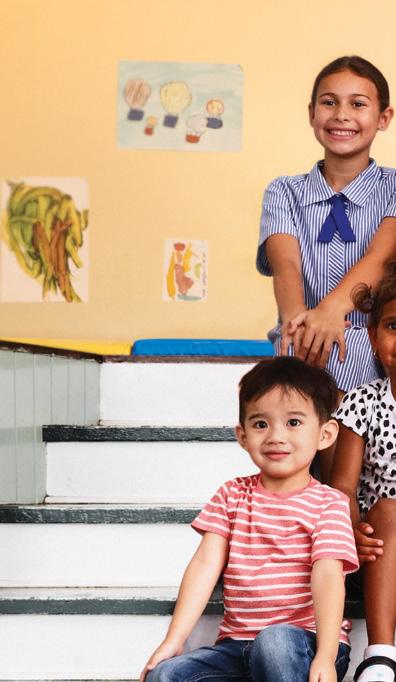
JUNE 2018 31
Get
at education.gov.au/childcare. More support for more
the Australian Government, Capital Hill, Canberra.
out more
families. Authorised by


32 JUNE 2018 www.indianlink.com.au





































































 BY AVI CHANDIOK
BY AVI CHANDIOK

























 Janaki Lenin
Janaki Lenin

 Sujay Kantawala
Sujay Kantawala










































 Subhash K. Jha
Subhash K. Jha







































































































































